#rather than dissection and discussion of his character and what makes up his bits and bobs
Explore tagged Tumblr posts
Note
sorry if you've discussed this before, but do you think ginny's quidditch talent came out of nowhere? it's a common criticism I see about her but I feel like that kind of overstates how much of a quidditch "star" she was at the beginning, like she was consistently described as good but not great until partway into hbp and I also think it makes sense she'd keep it a secret from her teasing brothers. but maybe they're right and I'm just biased towards defending ginny
thank you for the question, anon!
the short answer is - no, i think it's (just about) plausibly rendered in the books. i think the series gets away with it because:
the story is told from the perspective of a teenage boy aka peak obliviousness in corporeal form, so we see what harry sees (and harry notices big fat nothing)
there is an entirely adequate narrative explanation for ginny's sporting skills that most readers not operating in bad faith* can put together, as you suggest: ginny comes from a sporty family who are all good at quidditch; she is of middling-to-good seeking ability when she first joins the team in ootp; she then has a good few months flying several times a week where she would necessarily grow in confidence and experience, leaving her perfectly able to blossom in hbp in a high school sport where she is competing against other children. fine and dandy in my book.
also quidditch is a broadly dumb and pointless plot so ginny being good at it is just a fun extra that we don't need to deep too much because - let's be real - quidditch is a waste of page space.
*i say this because, most of the time, these takes come from those who don't like hinny as a pairing. which is entirely their right and prerogative! it personally doesn't float my boat to spend my days doing worst faith readings of the text in order to make the case against canon ships i don't like, but as this is a race to the bottom - we are all adults dissecting children's books written by a nasty spiteful woman rotting in her mouldy castle spouting slurs, after all - who am i to judge.
(i also suspect the 'ginny is good at quidditch out of nowhere' takes have enjoyed such a long shelf-life on eg. reddit because the films are still most people's primary reference for HP takes so complaints about them then get cast back on the books - and, in the films, ginny does in fact rock up in film 6 like she's mbappé, if mbappé had the charisma of an extraordinarily soggy bath mat.)
with that said... could it have done with a bit more foreshadowing? yes, probably. people who don't like hinny as a pairing and prefer another are never going to be convinced - that's fine! but here i am, a paid-up hinny supporter, and even i think ginny's character development is sometimes wanting, to a frustrating and problematic extent. good writing (usually) means showing not telling, and it's weird and lazy of jkr to be so slapdash about revealing this and other character details about ginny and other (often female) characters. i think it's particularly striking that jkr underserves characters (again, usually women) who exist to serve the emotional development of characters (usually men), rather than the mystery plot(s) that drive hp as a series. (wanted! tonks' personality! last seen making fake pig noses and being the only auror mad eye moody mentored as his successor, for no plot reason!)
while i'm not a die-hard adherent to the chekhov's gun principle, i think one of the strengths of many novels du jour - especially the nothing really happens postmodern novel that crowds the bookshop shelves these days - is that their conventions allow authors to add colour to characters without each tiny detail being pregnant with meaning and in service of a driving plot that must be marched forward at all times. that can be really nice! as readers, we like to get a sense of characters as well-rounded living breathing people who go for a wee and take the bins out and stick on an album because it slaps every now and then; in these novels, we're also happier with the idea that things can happen to characters beyond the protagonist that don't directly impact the plot or demand the protagonist knows more than their own very limited vantage point. you have more room to play with character as a result.
jkr, ofc, isn't that kind of author. jkr is in fact an author for whom everything about her characters serves the plot. this, after all, is the brain that brought you 'remus lupin' the werewolf, and named the bad-guy-turned-good-guy in a book using a big black dog as a red herring omen of death 'sirius black'. jkr wants her audience to notice clues and remember little details about characters because they might be significant later on. this is entirely her wont and - lupin and sirius aside - she's often very good at it. the hp books are all standalone mysteries, and, when they land, those mysteries slap. ginny being the culprit in CoS is a genuinely satisfying resolution to the whodunit plot: this was reflected in critical reception at the time and was part of the reason why hp was able to be marketed as a children's book adults would also enjoy thereafter. there are also very satisfying foreshadowing and mystery plots that straddle the entire series and that reward the reader with reasonably good pay-off at the series end. (my favourite is the foreshadow within the foreshadow - e.g. regulus black barrelling back from ootp in DH, but then regulus' plot turning out to ultimately exist to foreshadow snape's own double agent status... delicious).
for my part, it's also what i want out of the fiction i read and the stories i try to write. i want everything to mean something. i want the weather, clothing, setting, body language etc to all do heavy lifting. i want character work to do work. it makes it fun for me to write and (i hope) it can it a bit more fun for the reader.
the problem is that while jkr is good setting up some mysteries, she is bad at others, and the romantic plot is one she falls down (a bit) on. she sets herself up for this: she wants to be a plot-centred mystery writer, so she does have an obligation to do better in how she deploys character details. jkr does to try to write the harry/ginny romance like a mystery, with little hints throughout the series up to the reveal of harry's feelings for ginny in HBP. (even ginny's full name is nominative determinism, finally revealed in DH once the reader has been told her place in the plot - ginevra, so guinnevre, the hero's queen). and while i will never not tire of pointing out to all of reddit that harry/ginny didn't come out of nowhere, and there is some satisfying foreshadowing knocking about here and there, i think it's fair to say that the harry/ginny build-up is not as satisfying as it could have been because jkr is basically lazier about the clues that ginny is the character harry will ultimately fall for, while she is much better at dropping clues for the series' central plot. that ginny ends the series with no real resolution of the primary tensions that motivate her other than her love of harry is probably the most acute example of this. but there's lots about her character where jkr phones it in a bit in fleshing her out or taking it to any logical conclusions or interesting plot directions. a smattering of examples:
ginny is the character who spends the entire series demanding to be included and not underestimated ends the series... with no real major role in the battle other than causing harry panic, while all other central characters receive a satisfying narrative arc that speaks to their central motivators across the series as a whole. (for an interesting discussion of what should have happened with ginny and the horcruxes, see here. i didn't even pay @saintsenara to write this!)
there are lots of shades of colour to ginny's character that are introduced pointlessly. i have previously talked about my beef with arnold the pygmy puff. we know ginny is popular but we know nothing of her friends who are all faceless plotless nobodies. we know ginny supports the all-womens quidditch team in a way that implies a nascent feminist politics after a childhood being excluded from playing a sport she loves by her brothers - yet we know nothing of it. we know ginny loves the one wizarding band that seems to exist because she has a poster of them on her wall and it just.... is something we just get told about her. now, all of these suggest ginny is a good time gal and a right laugh at the pub. and that's nice! i too am fun at the pub! but why does it matter? it wouldn't, in another series. but in a series where Everything Matters, it really stands out.
now..... i don't think all of this is an unsolveable problem for those of us writing fanfiction about ginny or harry and ginny as a couple. i don't think this makes ginny an inherently bad character. i hope the amount of life i have wasted thinking about this character is testament to this (...) and i personally find trying to cook up some fleshed-out characterisation and a satisfying arc for ginny, and for female characters more generally, from the crumbs of the original source material to be a very rewarding way to pass the time and a fuck you to a woman who thinks she can gatekeep womanhood while writing some astonishingly antifeminist fiction. i think harry and ginny are a deeply compelling and eminently plausible couple, and i think i return to writing about them as much as i do because i think they have a ton of potential as narrative mirrors and as characters with a rich well of tension but also devotion between them. as i say a lot, i think one of the things the harry/ginny pairing does refreshingly well compared to other romantic lead couples in YA fiction is show a couple that, at heart, genuinely get on very well, have a laugh together and enjoy each other's company in completely mundane lovely day-to-day ways (laundry and taxes u know). i think that's a striking and refreshing dynamic that i like to spend time fleshing out and playing with and writing about. but i can also see that there is an inconsistency in jkr's character work here, particularly her character work writing female characters, of which ginny is among the most acute examples.
#this is one of those ones where i realised i cared deeply about this halfway through#and then it all got away from me#it was important i got the soapbox out!#it was getting real dusty!#meta#ginny weasley#hinny
21 notes
·
View notes
Text
'...“It’s fun playing bad, but actually he’s not,” the actor says, smiling as he reflects on his character, Crowley. “He’s a villain with a heart. The amount of really evil things he does are vanishingly small.”
...As it always has, “Good Omens” dissects the view of good and evil as absolutes, showing viewers that they are not as separate as we were led to believe growing up. Aziraphale and Crowley’s long-standing union is proof of this. The show also urges people to look at what defines our own humanity. For Tennant — who opted to wear a T-shirt emblazoned with the words “Leave trans kids alone you absolute freaks” during a photocall for Season 2 — these themes are more important now than ever before.
“In this society that we’re currently living in, where polarization seems ever more present, fierce and difficult to navigate. Negotiation feels like a dirty word at times,” he says, earnestly. “This is a show about negotiation. Two extremes finding common ground and making their world a better place through it. Making life easier, kinder and better. If that’s the sort of super objective of the show, then I can’t think of anything more timely, relevant or apt for the rather fractious times we’re living in.”
“Good Omens” is back by popular demand for another season. How does it feel?
It’s lovely. Whenever you send something out into the world, you never quite know how it will land. Especially with this, because it was this beloved book that existed, and that creates an extra tension that you might break some dreams. But it really exploded. I guess we were helped by the fact that we had Neil Gaiman with us, so you couldn’t really quibble too much with the decisions that were being made. The reception was, and continues to be, overwhelming.
Now that you’re no longer bound by the original material that people did, perhaps, feel a sense of ownership over, does the new content for Season 2 come with a sense of freedom for you? This is uncharted territory, of sorts.
That’s an interesting point. I didn’t know the book when I got the script. It was only after that I discovered the worlds of passion that this book had incited. Because I came to it that way, perhaps it was easier. I found liberation from that, to an extent. For me, it was always a character that existed in a script. At first, I didn’t have that extra baggage of expectation, but I acquired it in the run-up to Season 1 being released… the sense that suddenly we were carrying a ming vase across a minefield.
In Season 2, we still have Neil and we also have some of the ideas that he and Terry had discussed. During the filming of the first one, Neil would drop little hints about the notions they had for a prospective sequel, the title of which would have been “668: The Neighbour of the Beast,” which is a pretty solid gag to base a book around. Indeed there were elements like Gabriel and the Angels, who don’t feature in the book, that were going to feature in a sequel. They were brought forward into Season 1. So, even in the new episodes, we’re not entirely leaving behind the Terry Pratchett-ness of it all.
It’s great to see yourself and Michael Sheen reunited on screen as these characters. Fans will have also watched you pair up for Season 3 of “Staged.” You’re quite the dynamic duo. What do you think is the magic ingredient that makes the two of you such a good match?
It’s a slightly alchemical thing. We knew each other in passing before, but not well. We were in a film together [“Bright Young Things,” 1993] but we’d never shared a scene. It was a bit of a roll of the dice when we turned up at the read-through for “Good Omens.” I think a lot comes from the writing, as we were both given some pretty juicy material to work with. Those characters are beloved for a reason because there’s something magical about them and the way they complete each other. Also, I think we’re quite similar actors in the way we like to work and how we bounce off each other.
Does the shorthand and trust the two of you have built up now enable you to take more risks on-screen?
Yes, probably. I suppose the more you know someone, the more you trust someone. You don’t have to worry about how an idea might be received and you can help each other out with a more honest opinion than might be the case if you were, you know, dancing around each other’s nervous egos. Enjoying being in someone’s orbit and company is a positive experience. It makes going to work feel pleasant, productive, and creative. The more creative you can be, the better the work is. I don’t think it’s necessarily a given that an off-screen relationship will feed into an on-screen one in a positive or negative way. You can play some very intimate moments with someone you barely know. Acting is a peculiar little contract, in that respect. But it’s disproportionately pleasurable going to work when it’s with a mate.
Fans have long discussed the nature of Crowley and Aziraphale’s relationship. In Season 2, we see several of the characters debate whether the two are an item, prompting them to look at their union and decipher what it is. How would you describe their relationship?
They are utterly co-dependent. There’s no one else having the experience that they are having and they’ve only got each other to empathize with. It’s a very specific set of circumstances they’ve been dealt. In this season, we see them way back at the creation of everything. They’ve known each other a long time and they’ve had to rely on each other more and more. They can’t really exist one without the other and are bound together through eternity. Crowley and Aziraphale definitely come at the relationship with different perspectives, in terms of what they’re willing to admit to the relationship being. I don’t think we can entirely interpret it in human terms, I think that’s fair to say.
Yet fans are trying to do just that. Do you view it as beyond romantic or any other labels, in the sense that it’s an eternal force?
It’s lovely [that fans discuss it] but you think, be careful what you wish for. If you’re willing for a relationship to go in a certain way or for characters to end up in some sort of utopian future, then the story is over. Remember what happened to “Moonlighting,” that’s all I’m saying! [Laughs]
Your father-in-law, Peter Davison, and your son, Ty Tennant, play biblical father-and-son duo Job and Ennon in Episode 2. In a Tumblr Q&A, Neil Gaiman said that he didn’t know who Ty’s family was when he cast him. When did you become aware that Ty had auditioned?
I don’t know how that happened. I do a bunch of self-tapes with Ty, but I don’t think I did this one with him because I was out of town filming “Good Omens.” He certainly wasn’t cast before we started shooting. There were two moments during filming where Neil bowled up to me and said, “Guess, who we’ve cast?” Ty definitely auditioned and, as I understand it, they would tell me, he was the best. I certainly imagine he could only possibly have been the best person for the job. He is really good in it, so I don’t doubt that’s true. And then my father-in-law showed up, as well, which was another delicious treat. In the same episode and the same family! It was pretty weird. I have worked with both of them on other projects, but never altogether.
There’s a “Doctor Who” cameo, of sorts, in Episode 5, when Aziraphale uses a rare annual about the series as a bartering tool. In reality, you’ll be reprising your Time Lord role on screen later this year in three special episodes to mark the 60th anniversary. Did you always feel you’d return to “Doctor Who” at some point?
There’s a precedent for people who have been in the series to return for a multi-doctor show, which is lovely. I did it myself for the 50th anniversary in 2013, and I had a wonderful time with Matt [Smith]. Then, to have John Hurt with us, as well, was a little treat. But I certainly would never have imagined that I’d be back in “Doctor Who” full-time, as it were, and sort of back doing the same job I did all those years ago. It was like being given this delightful, surprise present. Russell T Davies was back as showrunner, Catherine Tate [former on-screen companion] was back, and it was sort of like the last decade and a half hadn’t happened.
Going forward, Ncuti Gatwa will be taking over as the new Doctor. Have you given him any advice while passing the baton?
Oh God, what a force of nature. I’ve caught a little bit of him at work and it’s pretty exciting. I mean, what advice would you give someone? You can see Ncuti has so much talent and energy. He’s so inspired and charismatic. The thing about something like this is: it’s the peripherals, it’s not the job. It’s the other stuff that comes with it, that I didn’t see coming. It’s a show that has so much focus and enthusiasm on it. It’s not like Ncuti hasn’t been in a massive Netflix series [“Sex Education,”] but “Doctor Who” is on a slightly different level. It’s cross-generational, international, and has so much history, that it feels like it belongs to everyone.
To be at the center of the show is wonderful and humbling, but also a bit overwhelming and terrifying. It doesn’t come without some difficulties, such as the immediate loss of anonymity. It takes a bit of getting used to if that’s not been your life up to that point. I was very lucky that when I joined, Billie Piper [who portrayed on-screen companion, Rose] was still there. She’d lived in a glare of publicity since she was 14, so she was a great guide for how to live life under that kind of scrutiny. I owe a degree of sanity to Billie.
Your characters are revered by a few different fandoms. Sci-fi fandoms are especially passionate and loyal. What is it like being on the end of that? I imagine it’s a lot to hold.
Yes, certainly. Having been a fan of “Doctor Who” since I was a tiny kid, you’re aware of how much it means because you’re aware of how much it meant to you. My now father-in-law [who portrayed Doctor Who in the 80s] is someone I used to draw in comic strips when I was a kid. That’s quite peculiar! It’s a difficult balance because on one end, you have to protect your own space, and there aren’t really any lessons in that. That does take a bit of trial and error, to an extent, and it’s something that you’re sometimes having to do quite publicly. But, it is an honor and a privilege, without a doubt. As you’ve said, it means so much to people and you want to be worthy of that. You have to acknowledge that and be careful with it. Some days that’s tough, if you’re not in the mood.
I know you’re returning to the stage later this year to portray Macbeth. You’ve previously voiced the role for BBC Sounds, but how are you feeling about taking on the character in the theater?
I’m really excited about it. It’s been a while since I’ve done Shakespeare. It’s very thrilling but equally — and this analogy probably doesn’t stretch — it’s like when someone prepares for an Olympic event. It does feel like a bit of a mountain and, yeah, you’re daring to set yourself up against some fairly worthy competition from down the years. That’s both the challenge and the horror of doing these types of things. We’ve got a great director, Max Webster, who recently did “Life of Pi.” He’s full of big ideas. It’s going to be exciting, thrilling, and a little bit scary. I’m just going to take a deep breath.
Before we part ways, let’s discuss the future of “Good Omens.” Gaiman has said that he already has ideas for Season 3, should it happen. If you were to do another season, is there anyone in particular you’d love to work with next time around or anything specific you’d like to see happen for Crowley?
Oh, Neil Gaiman knows exactly where he wants to take it. If you’re working with people like Gaiman, I wouldn’t try to tamper with that creative void. Were he to ask my opinion, that would be a different thing, but I can’t imagine he would. He’s known these characters longer than me and what’s interesting is what he does with them. That’s the bit that I’m desperate to know. I do know where Crowley might end up next, but it would be very wrong if I told you.
[At this point, Tennant picks up a pencil and starts writing on a hotel pad of paper.]
I thought you were going to write it down for me then. Perhaps like a clandestine meeting on a bench in St James’ Park, but instead you’d write the information down and slide it across the table…
I should have done! I was drawing a line, which obviously, psychologically, I was thinking, “Say no more. You’re too tempted to reveal a secret!” It was my subconscious going “Shut the fuck up!”
#David Tennant#Michael Sheen#Good Omens#Neil Gaiman#Terry Pratchett#Ty Tennant#Peter Davison#Aziraphale#Crowley#Doctor Who#Macbeth#Ncuti Gatwa#Job#Ennon#Bright Young Things#Series 2#Matt Smith#John Hurt#Russell T. Davies#Catherine Tate#Max Webster#Life of Pi#Sex Education#Billie Piper#Rose Tyler#BBC Sounds
3K notes
·
View notes
Note
is there any text or tumblr post that dives into the ways in which sir lancelot is insane? like a freak? i’ve read a couple extracts ab him giving the idea that he was effed up a bit and like a whole murderbot with raging feelings of hatred and love? i would like to know more ab the crazy things he does or says that make ppl go “this man is a freakazoid”. also i adore your blog thank you for making sumn this nice!
hi there!
i'm unsure if you mean excerpts from medieval sources in which lancelot is "mad" or academic articles dissecting those instances...but i have both for you lol now a disclaimer: i'm neither a medievalist nor a psychologist, so all i can offer you is the raw material and my opinion. while we shouldn't "diagnose" anyone of the past as we do now, lancelot isn't a real person, so i think that affords us a little more freedom to speculate about him, and more importantly, what it is he represented: a medieval anxiety surrounding trauma and the resulting mental toll. info and sources below a cut. huge content warning for self harm and suicidal ideation.
Academic Sources: Medieval Attitudes Towards Mental Illness by Edith A. Wright, Of Metal and Men by Julie Singer, The Enemy Inside by Brian Burfield
Medieval Sources: The Knight of The Cart by Chréiten de Troyes, The Vulgate Cycle edited by Norris J. Lacy
so for starters, let's establish what it is people are responding to when they discuss lancelot's mental instability. the character first appears in "the knight of the cart" by chrétien de troyes, and right from the getgo, lancelot exhibits a lot of mental distress, up to and including, a suicide attempt.

from his inception, lancelot was unwell. at another point, he appears to disassociate so completely, he forgets his own identity, and loses perception of his body.
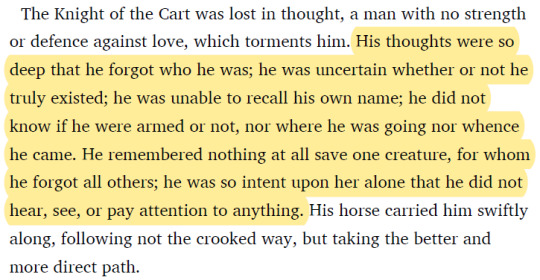
now you may have noticed that the text always links lancelot's episodes to his fixation on guinevere. we'd be here forever if we incorporated the way medieval authors offset the blame of their protagonists' deteriorating mental states onto the fault of a woman (see also: yvain/owain's madness when laudine/countess divorced him, tristan's madness out of longing for isolde, etc.) whereas when a woman shows upset, it's never attributed to her lover, but a shortcoming within herself. so for the sake of staying on topic, we'll focus on lancelot's symptoms as they are, rather than trying to unravel the middle ages-sized knot of misogyny that is the fictitious root of these madness episodes. "medieval attitudes towards mental illness" by edith a. wright discusses this trend in depth.
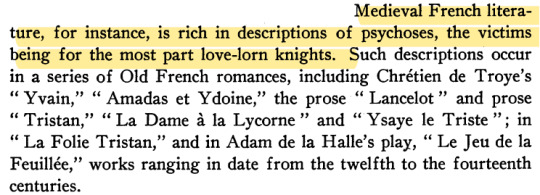
i'm going to be focusing on "the vulgate cycle" as my main source of lancelot's madness as he has multiple distinct episodes in that text written in excruciating detail that we can discuss. generally speaking, lancelot is presented as an extremely anxious individual that's highly susceptible to outside influence (whether that be guinevere's, galehaut's, etc.) but that in and of itself is not necessarily indicative of mental illness so much as a rarely explored introverted quirk of his personality. as discussed in "of metal and men" by julie singer, it seems lancelot's at his most confident when operating as an anonymous knight and therefore not subject to the scrutiny of societal expectation.

this, however, can develop in extreme ways when lancelot is pushed past his limits, and he succumbs to a berserker-like state neither his friends nor family can shake him from. while imprisoned at saxon rock, lancelot has to be segregated from the other prisoners, despite galehaut begging to be housed with him, the jailers refuse as lancelot's psychosis is so intense that he'd kill his fellow hostages and thus neutralize the enemy army's advantage. lancelot's refusal to eat exacerbates his symptoms. [Lancelot Part II, Ch. 71. Lancelot’s Madness and Cure; Defeat of the Saxons and Irish; Lancelot, Galehaut, and Hector Become Companions of the Round Table]

this psychotic episode continues even after lancelot is freed. eventually guinevere is forced to lock him alone in a room to protect the others, as he continues to attack anyone who comes near, including his own younger cousin and squire lionel who had attempted to talk him down and was struck. lancelot only recovers after his adoptive mother, the lady of the lake, arrives and utilizes strikingly modern de-escalation techniques, such as referring to lancelot by his childhood name to ground him, administering some medicine to help him sleep, allowing him uninterrupted rest, and then bathing him. (this is tinged with medieval mysticism, of course, but you get the idea.) the lady of the lake then instructs guinevere on how to care for him thereafter. once lancelot awakens from his magic/healing-induced coma, his sanity is restored.

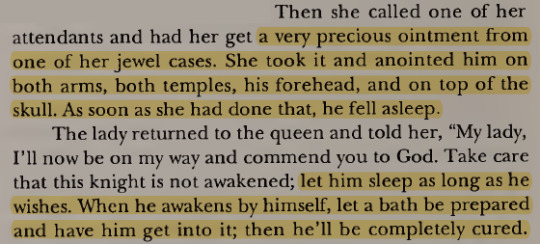
it feels important to note here that, once lancelot regains his senses, he feels ashamed of his behavior, and worries that his mental instability would cause guinevere to love him less. but she assures him that she loves him and is committed as long as they both live. even in medieval times, people recognized that a strong support system was of utmost importance for the mentally ill to thrive.

lancelot is, for the most part, stable for a time after this, contented to live at sorealis with galehaut (and guinevere for a bit as well). but growing restless, lancelot leaves galehaut's company to go adventuring. through some misunderstanding, galehaut believes lancelot had died, and thus dies of heartbreak himself. on discovery of his beloved's tomb, lancelot grieves so bitterly that he intends to kill himself on the spot. [Lancelot Part IV, Ch. 120. Lancelot Discovers Galehaut’s Casket and Defends It; Lancelot Rescues Meleagant’s Sister]


it's here that a messenger of the lady of the lake arrives. the lady had been informed by her oracle that this would happen, so acting quickly, she sent someone to intervene. the messenger takes the sword from lancelot and immediately gives him a task, one that would exhume galehaut and bring his body to where lancelot would eventually be buried beside him. in the short term, this prevented lancelot from harming himself, and in the long term, guided him toward shifting gears long enough that he eventually overcomes his grief through completion of his lady's instruction.
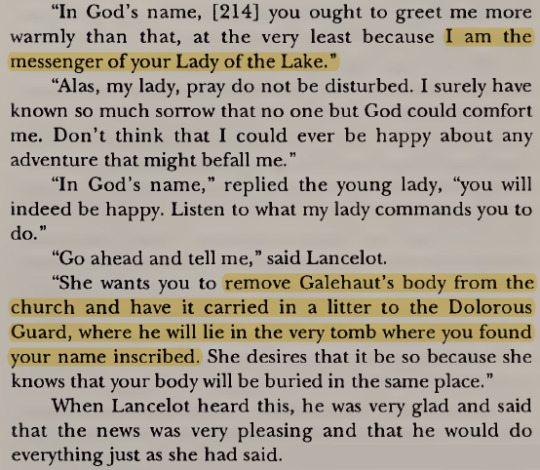
the next time lancelot is driven mad is after he is beguiled by elaine of corbenic into bed with her at camelot. (this is the second time, galahad had already been conceived). [Lancelot Part VI, Ch. 176 Lancelot and Arthur Go to Gaul; Claudas Abandons Gaunes; King Pelles’s Daughter Deceives Lancelot; Guenevere Expels Lancelot]
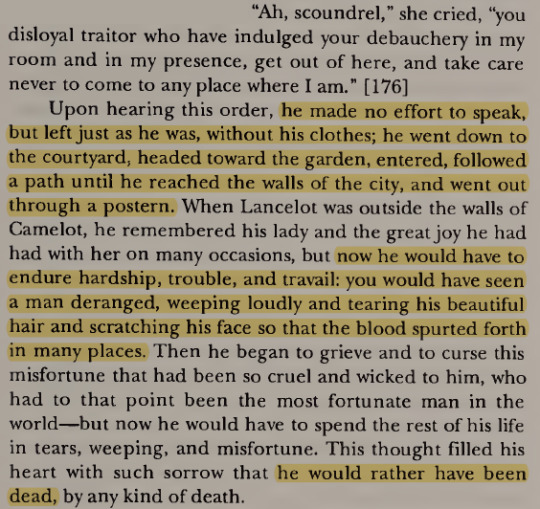
at this point, lancelot is beyond the reach of even his mother, the lady of the lake, so this psychotic episode persists for many years. he's declared missing and all of the knights set out in search of him, to no avail, and he is assumed dead. lancelot, meanwhile, survives the winter by attacking people and stealing their resources. [Lancelot Part VI, Ch. 178 Lancelot’s Madness and Subsequent Cure]


eventually, while lancelot is subdued in a deep sleep, a pair of charitable brother knights, recognizing that lancelot is unable to care for himself and a danger to those around him, successfully transport him to their castle. they don't know who he is. they keep him chained for safety but feed and clothe him. during this time, lancelot mutilates himself to be free.
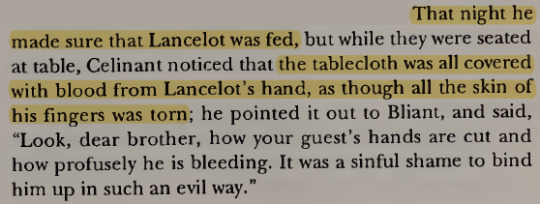
eventually, lancelot is calm enough to be freed from his bindings, and lives with the brothers in this way for two years. he eats little and completely loses touch with his identity and the reality of the world around him.
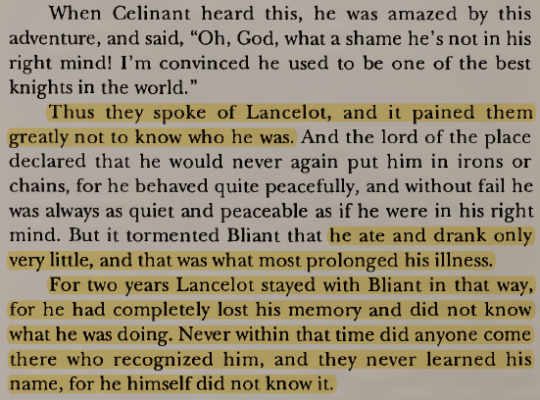
but one day, lancelot looks out his tower window and sees a passing boar. he's compelled to follow it and departs the castle of the brothers without a word. he ends up in a battle with the boar which he barely survives. a holy man happens upon him and tries to administer healing, but lancelot attacks him.
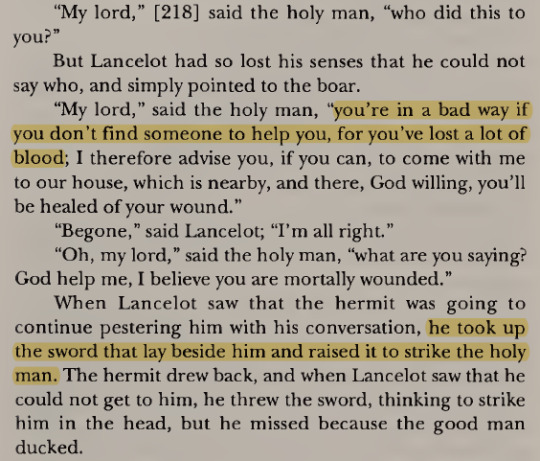
after this the holy man flees and enlists the help of some men-at-arms, who assist in capturing lancelot and forcibly strapping him to a litter to be drawn away. ultimately, despite the best intentions, lancelot's condition only worsens.
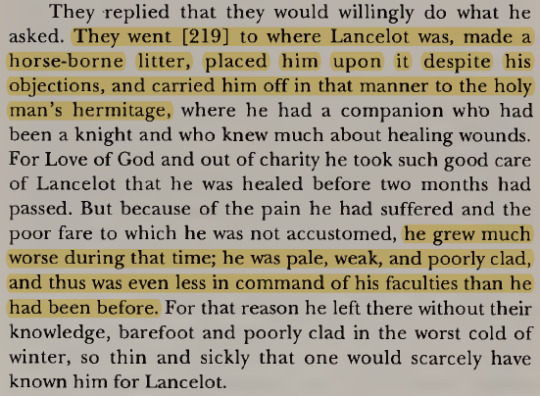
i'm going to make a brief aside here as this reminds me of an article i read detailing a similar situation which occurred in real life. in "the enemy inside" by brian burfield, john of ancaster suffered mental distress as a result of the war in france, subsequently inflicting harm on himself and others. in this case, it was his father that restrained him into a horse-drawn cart, and brought him to a place of healing which was revolutionary of the time period, as friar bartholomeus recognized the connection between trauma and mental distress without attributing it to demonic possession, thus attracting many people in need of help to his monastery for treatment. so there is, at least in part, historical precedence of similar occurrences.

anyway, back to lancelot. he eventually flees from his intended caretakers yet again and wanders to the town of corbenic. there the children recognize his madness and begin to harass him, throwing stones and sticks, until he's incited to retaliate and wounds anyone who crosses him. eventually he wanders into the castle itself. the courtlings recognize he's mad, and feed him scraps. satiated, he literally curls up and sleeps on the floor like a dog. it's this, at last, that allows him to begin the slow recovery to wellness.

finally, after all these years, someone recognizes lancelot for who he is. none other than elaine of corbenic.

she tells her father pelles and he concocts a plan to capture and cure lancelot using the power of the holy grail. so as the times before, they wait until lancelot falls asleep, and bind him up. then at long last, his senses are restored.

when lancelot awakens from his stupor, he knows not how he got there, but begins walking upright and talking coherently again. he implores pelles to explain how he came there. once up to speed. lancelot is grateful no one but pelles and elaine recognized him. now let it be made clear that while lancelot's psychotic episode had finally concluded, he's not otherwise alleviated of mental anguish. he's still depressed about his banishment from logres and camelot, and deeply ashamed of his many years spent mad. thus he requests of pelles to live somewhere far away, where no one but pelles and elaine will ever recognize him.
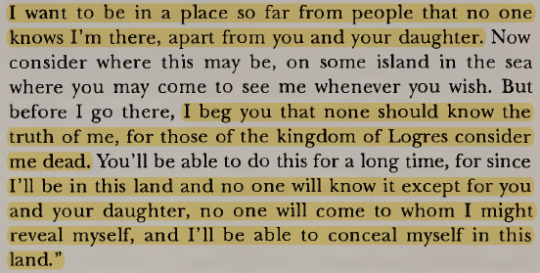
so an island with a castle is located on which lancelot can live and he, together with elaine and a small court, go there to stay. lancelot loses his knightly abilities and instead takes up the daily ritual of subjecting himself to painful memories of logres, which then in turn bring him "relief" and "comfort". an apt description of rumination and self harm.
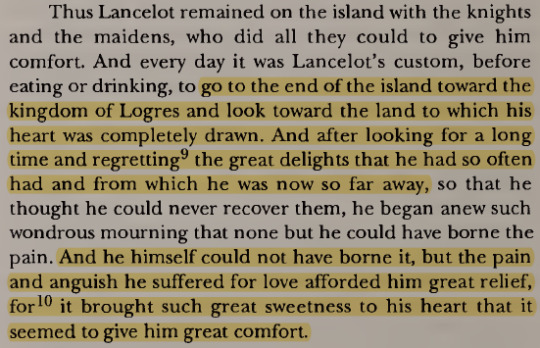
eventually, lancelot sends a secret message back to the land of logres intended to entice people to the island to fight him so he can relive the glory days.

in the end, it's lancelot's own half brother hector along with young and newly knighted perceval who find lancelot on the isle of joy. hector tells lancelot that the queen summons him, and lancelot immediately prepares to leave. on hearing this, galahad tells his grandfather he'll go and lodge in the abbey run by his great aunt, so that he might be nearer to his father. [Lancelot Part VI, Ch. 179 Hector and Perceval Find Lancelot, and They All Return to Camelot; Galahad’s Arrival Is Announced]
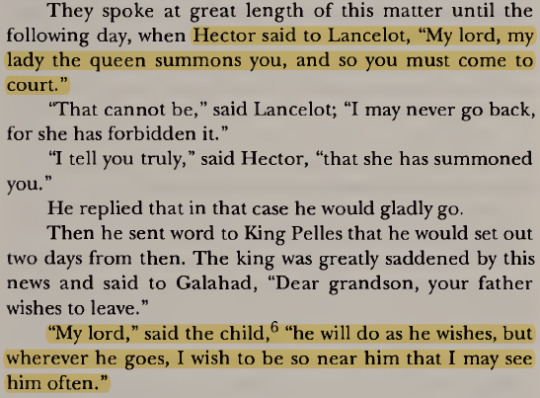
and with that, lancelot reenters society with his brother and son, which kicks off the grail quest in the subsequent book. that's a lot of info and reading, but all this to say that yeah, lancelot is known for his mental instability, to say the least. thanks for the ask!
#arthurian legend#arthurian legends#arthuriana#arthurian mythology#sir lancelot#lancelot#mental illness#ask#anonymous#my post
81 notes
·
View notes
Text
Ooohoohoo~ Thank you @damallarky for taking an interest in the likkle chess set we're assembling! (*/ω\*)
We'd be more than happy to share the rough outlines of what we're hoping to make with all of them.
Listed from (our ideas of) oldest to youngest;

El'hari:
Tentative Age: early-mid 40s
Faction: Veil Jumper
Class/Specialization: Orb & Dagger Mage (Spellblade)
Romance: Davrin
Juls' will finally be getting an old dalish boy of their very own! We do want him to be a lil younger than Andros, though not by much. Think this will pair nicely with some of the information we've seen through the Veil Jumper background. We're unlikely to get it through the game-proper, but we LOVE the idea of Darvin n him calling eachother "Hahren" & "Dalen" respectively, teasingly. X3c Rather even-tempered and something of a cool customer otherwise, and someone who puts his people first. Be it his clan, the Dalish/elves at large or any given group he's charged with. Another fun and possible tension point with regards to another piece of faction based backstory. This will depend on how long the Veil Jumpers have been active, but maybe he thought he could do more for his people with the Veil Jumpers than by taking up the mantle as Keeper to his Clan. Essentially named "Eclipse", deriving from the elven words "Elgara" (Sun) and "Harillen" (Opposition).

Isska:
Tentative Age: mid-late 30s
Faction: Grey Warden
Class/Specialization: Two handed heavy weapon Warrior (Slayer)
Romance: Lace Harding
We'll essentially be attempting a Beta Von, Male Qunari redemption arc with him. He has a mind for more delicate interests but was pigeon-holed into being a heavy front-liner by the Tamassrans. His name is derived from the qunari words "Iss" ( which denotes an item to be of Veteran/Experienced level) and "Katari" (One who brings death) Making him a Tal' Vashoth, that left the Qun proper. Haven't figured out the specifics on how he joined the wardens yet.

Segwin:
Tentative Age: mid 30s
Faction: Mourn Watcher
Class/Specialization: Staff-wielding Mage (Death Caller)
Romance: Taash
Rather formal in both the way he speaks as well as the up-keeping of his person. Bit of an eccentric when it comes to discussions surrounding his field of interest; various biological and anatomical study via dissection and the like. An Excitable Mortician is what I mean to say and Big fan of Professor Volkarin (sat in on some of his lectures and what have you).

Ath'ema:
Tentative Age: mid-late 20s
Faction: Lord of Fortune
Class/Specialization: Bow & Arrow Rogue (Saboteur)
Romance: Lucanis Dellamorte
Fuckboy 1. Heavy on the teasing. Injured and loss use of this right eye during a mishap with one of his inventions/traps early in his career/journey as a saboteur. Ath'ema's name is derived from the elven words "Athim" (Humility) and "Emma" (to become). Be humble, it's ironic.

Sulehn:
Tentative Age: mid-late 20s
Faction: Lord of Fortune
Class/Specialization: Dual Blade Rogue (Duelist)
Romance: Bellara Lutare
Fuckyboy 2. Absolute Chad jock type. Myre's doing a "Shep n Von Redux" with these actual twin brothers of him n Ath'ema. Sulehn's name is derived from the elven word "Sulahn'nehn" (to sing, or rejoice) Both Sulehn and Ath'ema are absolutely decked out in tattoos and various piercings.

Iero:
Tentative Age: early-mid 20s
Faction: Antivan Crow
Class/Specialization: Sword & Shield Warrior (Reaper)
Romance: Neve Gallus
Short and a rather Hothead butch. A very "Ready, Fire, Aim" type character. Juls will be attempting a sort of Beta Venui Revival with this one (aka an aggressive tiny elf warrior with perhaps a dash of snark ).

Kellum:
Tentative Age: early 20s
Faction: Shadow Dragon
Class/Specialization: Orb & Dagger Mage (Evoker)
Romance: Emmrich Volkarin
Well meaning, in that he doesn't really think things through… or rather as far as he should be. Gonna make him a bit of a "problem-child" in that regard for Von (who we're gonna say is his personal overseer within the Shadow Dragon faction). A sensitive lad otherwise.
And that's what we got so far, again relatively rough and broad stuff that will be honed in and fined tuned when we dive into the game ourselves through the expected multiple playthroughs we'll need to get through all these romances (and then some).>:3c
Happy they've caught your interest all the same, and hope you'll enjoy them some more when we've gotten em locked down!
#damallarky#dragon age#dragon age: the veilguard#el'hari aldwir#rook aldwir#isska thorne#rook thorne#segwin ingellvar#rook ingellvar#ath'ema laidir#sulehn laidir#rook laidir#iero de riva#rook de riva#kellum mercar#rook mercar#Don't wanna dig ourselves into any holes by solidifying any character details before we actually play#and know the boundaries or extensiveness of Rooks personality and how players can define that#I for one don't want that Hubris!#Most concerned about Segwin and Kellum not coming through as we're envisioning them-- BUT WE'LL JUST HAVE TO SEE FOR OURSELVES.#ath'ema n sulehn are the most vague bc we just dont know enough about the Lords of Fortune#--but Dalish Rivani sounds pretty cool though >:D#demi sibs replies
11 notes
·
View notes
Note
For the ask game :)
Same Weird Family (the series): 1, 4, 5, & 9
Thanks, @assaily, for the ask! I'm going to answer this based on Same Weird Family, the first in the series because I haven't gotten to talk about that one yet. It's the first fic I wrote (that you know of, lol) so while I now find parts of it a bit rough, it'll always be near and dear to me as it came about due to a visceral need to word vomit about these characters.
1: What inspired you to write the fic this way?
I started this fic a few weeks after S2, and like many I was absolutely inspired by the absolute savagery and increasing desperation of Five in that season. From killing the board to rewinding time, Five did so much for his family that season and none of them knew about it. Plus, the season ended in a new timeline, so the "what's going to happen next?" opportunities were almost endless.
I was also deeply inspired by those who took a stab at post S2 before me, including but definitely not limited to NonLinear Theory for Dummies, The Walls Kept Tumbling Down, Creeping Towards Extinction, and Tangled in the Hanging Tree. If you haven't read these and you like my fic, you're going to love these. They are all angsty and excellent.
4: What’s your favorite line of dialogue?
I'm gonna call out Allison here, because while she didn't get a lot of focus in this fic, I think she deserves a chance to yell at her brothers more often.
“Well, if we can’t take him to the hospital-” Allison’s words returned them to the practical matters. She looked around as Diego and Luther both shook their heads at her as confirmation. Vanya looked torn but didn’t disagree. Klaus remained focused on Five. “-we’ll have to watch him. We’ll take shifts.” “Oh boy, Five’ll just love that,” Diego scoffed. “He’s unconscious. He’ll deal,” Allison pointed out, closing the discussion. She finished cleaning up Five’s injuries and straightened his clothes. “And if you guys are done with playing pissing contest,“ she gave a pointed look to both Diego and Luther, “you can help me get him upstairs to the bedroom."
5: What part was hardest to write?
Chapters 1-6 and part of 7 came at me fast and furious, but I floundered a bit trying to get through 7 and 8 to the end. I think the writing is a bit awkward and it does make me cringe a bit.
9: Were there any alternate versions of this fic?
Not alternate versions so much as I did a lot of rewriting (I'm a pantser; I try to let my characters speak and sometimes they surprise me)
If you'll permit me to tag onto your ask, I'd also like to answer 3: What’s your favorite line of narration?
I spent a lot of time dissecting Five's internal emotions during this fic, trying to make sense of what drives Five - the anger and frustration and desperation that we saw on screen in S2, and beyond. I'm quite proud of some of it. Here's a snip:
“FIVE!” The shout cleaved him violently from his thoughts. Five blinked, confused, and looked up. His mind registered that his name had possibly been said more than once. Oh, he remembered, almost absently. His siblings were pestering him. Five sighed. All of the energy that had once fueled his rage was gone, drained away as quickly as it had spiraled up. Anger merely simmered now, rather than burned. He no longer felt dizzy, just…tired. In the clarity of hindsight, Five knew he hadn’t ever really been angry at his siblings. Annoyed, sure. Frustrated. But anger was reserved for the fact that Luther and Diego’s questions dragged things out of the little box, things that snagged and pulled at the cracks and exposed his weakness. For the memory of the light fading out of Klaus’s eyes, reaching for Five but still dead before he hit the ground. For the way that Vanya’s body crumpled like a discarded paper doll. Mostly, Five’s anger was directed at himself. For being played, and not figuring out the only possible end to the Handler’s deal until it was much too late. If he had been thinking clearly. If he only… Stop, Five. There’s no good destination down that road. “Five, we just want to help you” the soft voice said. He still didn’t care to pick out its owner. It didn’t matter. He couldn’t bear to keep listening. His siblings had died because of him. Again. And everything that happened afterwards – his survival, his thoughts, his actions – he could give them everything and still would never be enough to make it up to them. Never.
fic ask game
7 notes
·
View notes
Note
Give me a 20, 10, and 5 for the ask list please! Also boo hiss about the insomnia
-justalotoffanfic (I gotta get a shorter name)
I totally forgot about this list! lol, but thank you for sending in the ask! Had to think about it for a little bit though, sorry. Also yeah, insomnia is not great, it gets worse in the darker months cuz my body thinks I'm lying to it, but yay~ writing time til I can pass out lol
Here's the list if someone sees this and wants to see that whole thing, yes I'm still accepting asks from it. ASK LIST
[5] Is there a tiny detail in one of your fics that you feel goes tragically unnoticed?
Hm..... This feels like a wishy washy answer, but there are actually lots of things in my fics that I think aren't noticed by a lot of people, but that's perfectly ok! Everyone notices different things, and I wrote things the way I did because I NEEDED to get them out, not because I needed someone else to notice them. I know I place a lot of emphasis on actions over words, or speaking the bare minimum with words and defining emotions through actions and things that go noticed and unnoticed, but I know a lot of people just read the stories to unplug, not to think about all the little significances that are only coded towards ME anyway. For example, in SMR i have Donnie show his *want* to touch reader through the way his shoulders cave into their space. It's not him giving into his desires, and so the way I let the audience know the *desire* is there is through how his shoulders cave towards them. I'm not sure where I picked that particular trait up, but I've always liked stories that give sensory telltales and then leave it up to the reader to dissect them. Like, I would rather have characters *show* how comfortable they are through touch than, say, kissing. Kissing is such an easy way to show affection, and don't get me wrong I love writing kissing, physical affection is a love language of mine, but Leo letting reader run their hands over his arms means more to me than him kissing them, if that makes sense.
[10] If you could banish a single trope to live at the bottom of the ocean, never to be seen again by any human eyes (or at least your own) which trope would that be?
Oo that's a tough one, because I'm more from the 'if I stay over here with my sandbox and you have your sandbox, I don't care what you do in yours as long as you don't try to break my toys" sort of approach to tropes. Now, this next thing I'm about to say is not a direct attack on anyone, I just don't like it in my "sandbox" so to speak. Crying during intimacy. I just can't stand it. And I don't mean tears of like overstimulation or tearing up cuz it feels so good, I mean writing characters having intrusive thoughts at the end of intimacy and just going into a depressive sad swan dive into a crying jag. Like. Great. Now's the time to look your partner in the eyes and start crying because they've had a shitty life or you just remembered how you wanted a love like your parents and you've found it.... Idk I just don't wanna think about my parents or depressive shit right then. Like: Ah yes, I am in fact liquid limbs right now from the good time loving. Time to cry over me. No, no, it's fine, what's one more bodily fluid afterall. Ok, that's all, I hope if this is someone's jam though don't take my words personally please. I love you and your sandbox hypothetical person, and if you hold your writing up I will clap for it, I just won't add it to my sandbox
[20] Is there anything about any one of your fics that you have been dying to discuss but haven't had the chance to?
*inhales so sharply i start vibrating in my seat* there is. Oh there is, but idk if I can talk about it yet, since It's technically in the planning stages. I will have to settle on dropping some stuff about SMR that I have been keeping on the back burner that I wrote into the story originally, but I don't know if it'll be directly mentioned in the writing. Hoyt has a strictly platonic relationship with reader, and the reason he's in the story is to tie it more to M*A*S*H and a little bit more of the characterization of how I handled the reader character at first. Because at first pass of the story, it was more of a slow burn where reader actively kept their feelings for Donnie on lockdown, and Donnie was the one making repeated entreaties to get them to help their group, sort of a 'hey this medic keeps showing up where ever we're fighting and I keep saving them why are they throwing themselves into danger?" sort of thing, but it required the story to be told more from Donnie's point of view and I ultimately moved away from that. Reader was a lot more distant in that one as well, and fighting Donnie's interest in them. So when I changed that to reader and Donnie more so orbiting around each other from the beginning, Hoyt was created to stuff most of that wariness and distrust into. He acts as the 'voice of reason' in the storyline, as we'll see in the next couple of chapters especially. I might one day do a little one-shot of all the snippets I have stored away of Donnie basically chasing reader through different battlefields, always trying to get them to turn and acknowledge that they want the same things, and reader being just caught up more so in the fatality mindset of not knowing/caring if they survived. I'm glad I decided to go with the found family trope over it because I don't think the original left room for reader to bond with the other turtle family members.
6 notes
·
View notes
Text
Character Spotlight: William Riker
By Ames
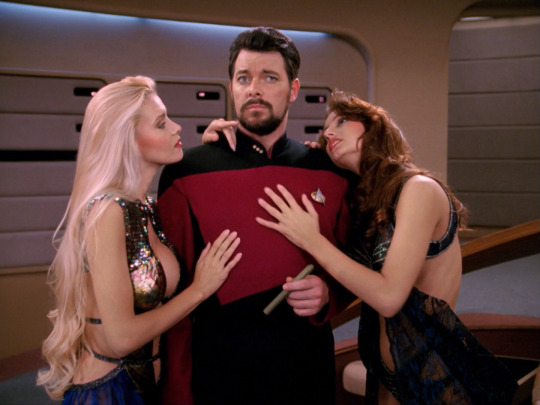
A Star to Steer Her By is continuing on our diplomatic conference Who’s Who in Starfleet with the Enterprise-D’s bearded dynamo, Commander William T. Riker. He’s The Next Generation’s answer to the Captain Kirk character, but with possibly more manwhoring around and he leaves the actual leadership to Captain Picard. Ya know, so he can do more manwhoring!
But of course, Will Riker is so much more than a pretty beard. So swing your leg over the back of that chair and have a seat as we focus on Picard’s number one (and we don’t mean the dog). Some of our favorite and least favorite Riker moments are outlined below and you can listen to this week’s podcast episode (jump to 1:05:52) for the full discussion. Shields up! Rrrrrrred alert!
[Images © CBS/Paramount]
Best moments
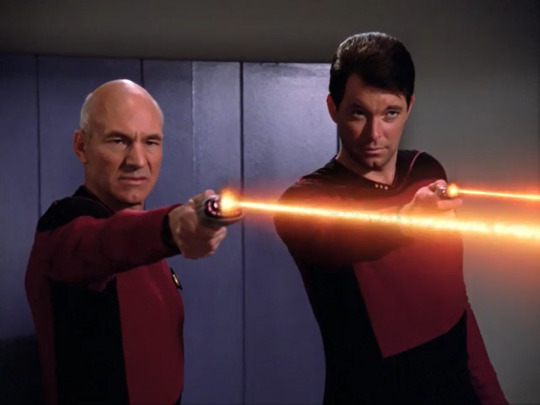
Guess I’ll go eat worms Whoops, I was wrong on the podcast when I said Riker ate the mealworms in “Conspiracy” (I was probably thinking of the next item on this list); he’s about to take a big bite before he turns the tables on the baddies. But he still does get to pretend to be mind-controlled by the bug monster, infiltrate the admirals’ dinner, and then utterly explode Remmick and the queen bug!

Gagh is always best when served live Now in “A Matter of Honor,” Riker does get to eat some gagh when he’s on the officer exchange program with the Klingon ship. And he really takes charge while he’s serving aboard the IKS Pagh, punching the biggest brute in the room, making eyes at all their women, and challenging Captain Kargan all while upholding Klingon customs to a T.

Pinocchio is broken. Its strings have been cut. Ignoring that Phillipa Louvois put Riker in a situation that could have been avoided if they had an actual attorney represent Bruce Maddox in Data’s sapience trial in “The Measure of a Man,” Riker actually does a pretty good job lawyering. But what really does well for his character is the final scene where he is lamenting how close he got to getting Data dissected, and that’s lovely.
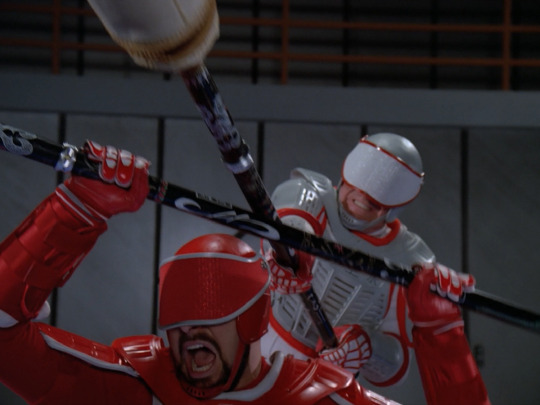
The illegal move, hachidan kiritsu We discussed a little bit how shitty a father Kyle Riker was to Will in our Parents blogpost, but we’ve got to give the younger Riker some credit for figuring out that daddy has been cheating him for years and years in anbo-jyutsu in “The Icarus Factor,” overcoming the influence that he’s had over his life, and making the decision for himself to stay on the Enterprise.
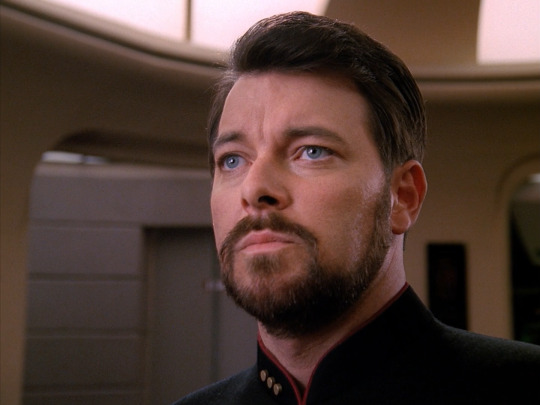
Mr. Worf, fire Not only does “The Best of Both Worlds” introduce us to Picard as Locutus, in all his glory and defeat, but we also finally get a taste of what Riker would be like as a captain. He’s been dodging getting his own ship for years now, and it’s rather surprising since we see that he can make the difficult decisions when he needs to, in this case firing on his own Borgified captain.
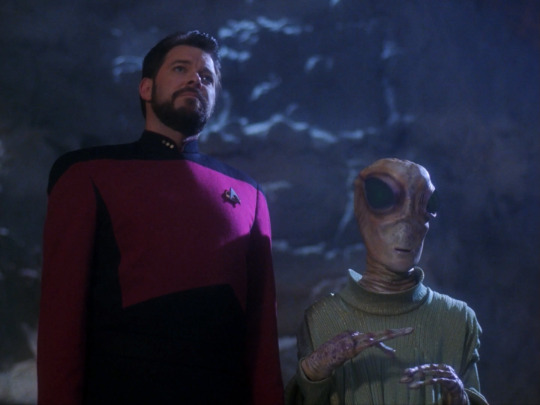
You don't have to be alone anymore We also see in several episodes on our list that Riker tends to get abducted an awful lot, and he figures out the respective ruses pretty smartly! In this case, in “Future Imperfect,” there’s practically a multi-part escape room for him to solve, and at the center of it is an abandoned young orphan who was one of the better children we discussed in our Kiddos post!
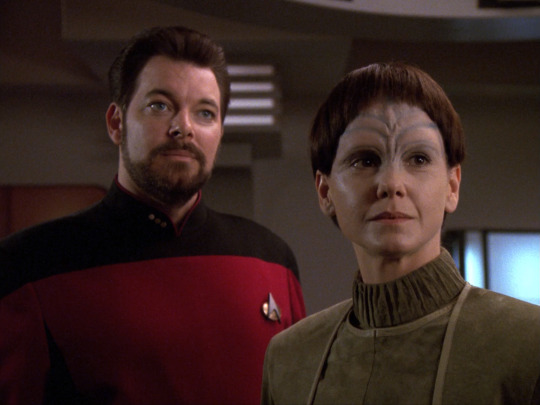
Star Trek says LGBTQ rights! You’ll see when you move on to our naughty Riker moments that a lot of his shitty relationships made the cut, but an actually meaningful and progressive relationship comes out of “The Outcast.” It was very moving watching Riker stand up for Soren, the J'naii scientist who just wanted to express the gender she identified as, which makes the episode’s resolution all the more heartbreaking.

Computer, create table Don’t worry, this won’t be the last time Riker gets abducted by aliens and deduces his way out of the problem. In “Schisms,” many crewmembers have been getting stolen away and experimented upon in their sleep, but Riker (with help from the holodeck’s renowned table program) goes in mostly conscious, saves a crewmember, and escapes. Now it’s time for a well-deserved nap!

Don't let them tell you you're crazy We have one final alien abduction in this list because we have to include the absolutely phenomenal “Frame of Mind”! Jonathan Frakes acts his ass off in this mindfuck of an episode, alternating between screaming about hallucinating things to actually hallucinating things. When he finally figures out that he’s being experimented upon yet again, it feels like a triumph.
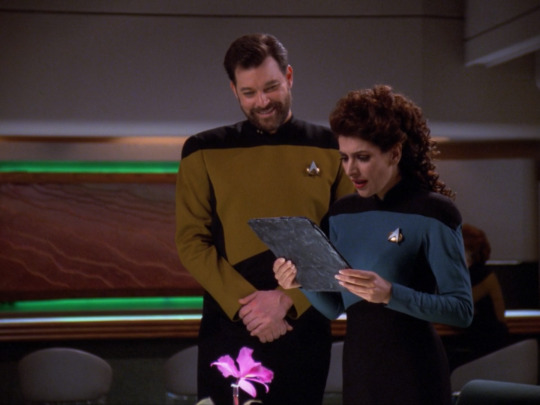
Play “Night Bird”! For all intents and purposes, Tom Riker is the same entity as Will Riker, so we’ll include his great moment in this list as well! We’ve got to give him credit in “Second Chances” for staying sane while abandoned for eight years on Nervala IV, which is a feat unto itself. So it’s just gravy that he also finally mastered playing “Night Bird” on the trombone and creating some fine phaser art!

I think the resemblance is rather striking We’ve got a couple of moments from “The Pegasus” to recount to you, on both batches of lists, so let’s start off with how cute it was for Riker to be so into celebrating Captain Picard Day! It’s just a delightful little exchange that shows the admiration that the first officer has for his captain. Imagine how fun Commander Riker Day must be!
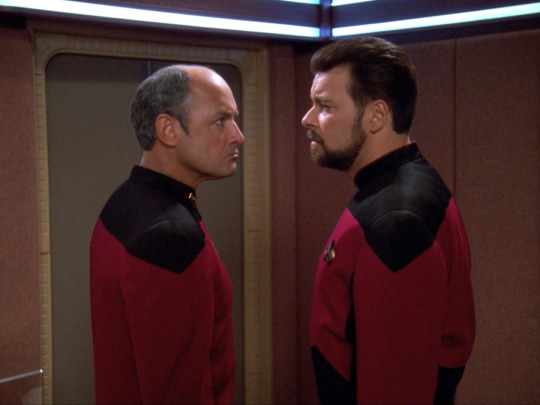
It was wrong twelve years ago, and it is wrong today Riker impresses us throughout the rest of “The Pegasus” by turning against one of Jake’s Corrupt Admirals, Eric Pressman, who is planning on using a phased cloaking device, utterly violating the Treaty of Algeron. It’s a great little character arc watching Riker’s guilt trip from having taken Pressman’s side years go to watching him defy orders to be on the side of what’s right!
—
Worst moments

If you liked it then you shoulda put a ring on it The Troi-Riker relationship throughout a lot of TNG was a bit confused and inconsistent, especially in the early episode “Haven” when Troi’s arranged marriage pops up. Riker is suddenly super jealous all episode long, moping about, whining at Troi, being mean to Wyatt, the works. Dude, you had your chance. And dude, she’s not pleased about it either! Chill out!

Taking mansplaining to another level Have we ever had a take on a matriarchal planet that wasn’t just plain sexist? That’s definitely on display in “Angel One” when all the Elected One of the society needs to see the errors of her people’s ways is for Riker to swoop in, take her to bed, and then have him take charge in that manly way of his. Why couldn’t this have been a job for Troi? Or Bev? Or Yar?

I don’t mean to be indelicate. But who’s the father?! Speaking of Troi (but not Yar because she was dead by this point), that weird relationship between Imzadis gets weirder in “The Child” when Troi gets knocked up by a lightning bug. And Riker, in full crazy ex-boyfriend mode, gets on her case about who the father is, and then starts trying to make decisions for Troi about the fate of her child.

You can't make an omelet without breaking a few eggs This is just a small detail we like to harp on, and that’s that Riker is supposedly making omelets for everyone at the top of “Time Squared” but what he actually makes are scrambled eggs. And not even good scrambled eggs! And evidently his cooking never gets better later in life, as we’re forced to watch him burn a pizza in “Nepenthe” in the series Picard as well!

One William Riker is unique, perhaps even special Oh boy, we’ve already talked a little bit about how problematic “Up the Long Ladder” is in our Picard post, but it’s more messed up than that. The Mariposans end up stealing DNA from Riker and Pulaski, and Riker is so enraged by this that he murders the clones that are created without any discussion first. Pretty much everything about this episode is a travesty though.
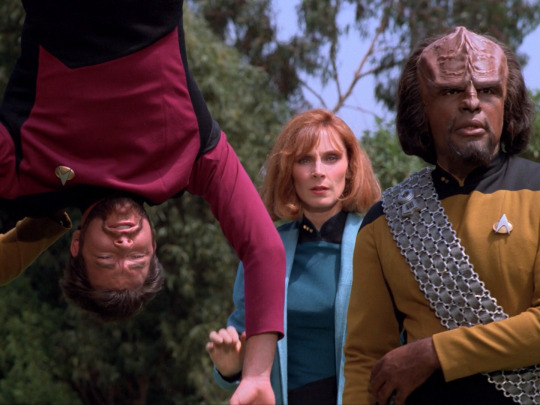
Always look before you leap I just think this one’s kinda funny but worth including if only for how dumb it is that Riker gets snared by some kind of trap Kevin Uxbridge set in “The Survivors.” A dangling Will Riker is just so goofy and ridiculous that I wanted to rewatch that scene a couple of times to laugh at what a buffoon this scene made of him.
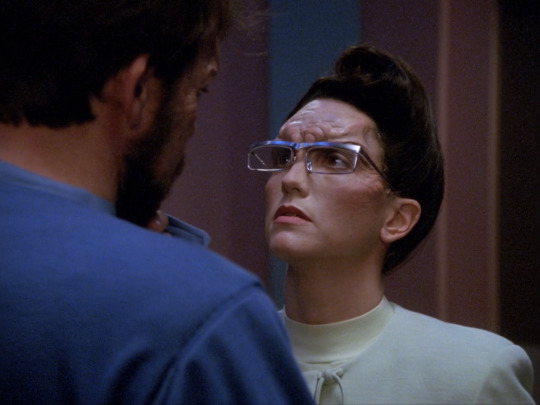
I've always wanted to make love with an alien So it’s pretty much implied that Riker bangs Lanel in the episode “First Contact” (not to be confused with the movie First Contact), right? I’ve said it to Nicolai Rozhenko and I’ll say it again: No sleeping with primitive people you’re observing while under cover, no matter the circumstances! No matter how thirsty she is! No matter what she’s offering in return! No!
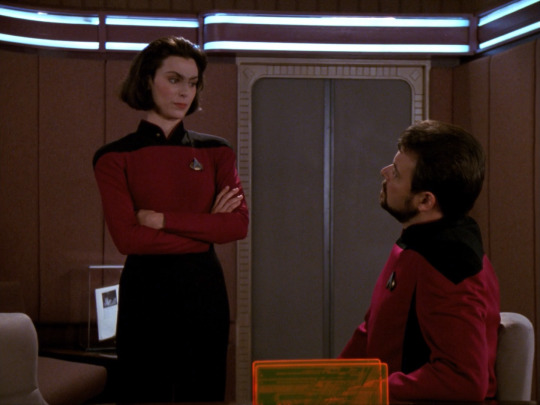
You will follow Starfleet uniform code aboard this ship, Ensign You rarely see hardass Riker come out and it’s really inconsistent when he does. So it practically comes out of nowhere when he suddenly orders Ro to take out her Bajoran earring in “Ensign Ro” even though it’s a part of her culture. No one makes Worf take off his baldric. And it’s not until Captain Jellico demands it that Troi has to get out of her damn pajamas.
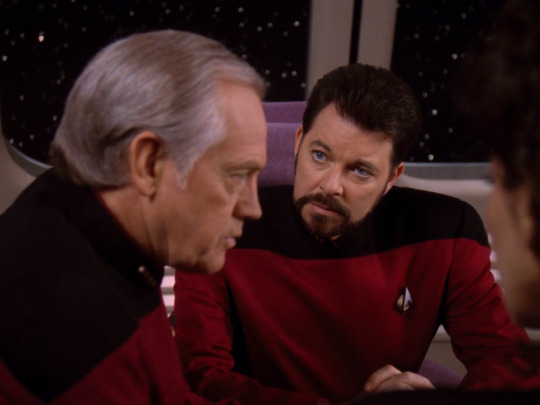
Let's drop the ranks for a moment Speaking of my man Jellico! Riker not only acts insubordinate to Picard’s replacement during “Chain of Command,” he just comes off as a whiny little bitch the whole time because Jellico does this differently than Picard. And Jellico has to come begging this petulant brat to pilot a shuttlecraft. Do your damn job, Riker. You’d never act like this to Picard.
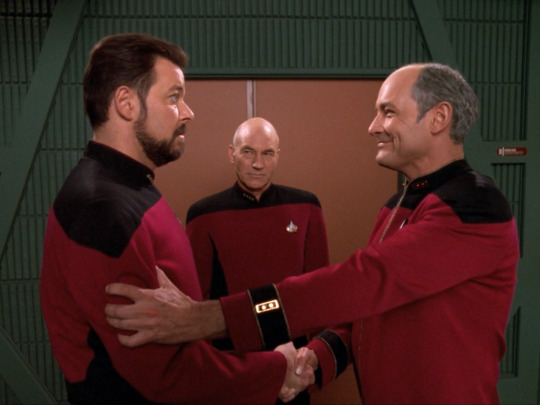
Mutiny on the Pegasus On the flip side, Riker had no problem following orders like a little sheep when he served with Pressman. Sure, he makes up for it later as we described above in “The Pegasus,” but first Riker sided with the obviously wrong and dangerous Captain Pressman, effectively sentencing every mutineer on the ship to a horrible death. Grapple with that, Riker. Oh, you already did.
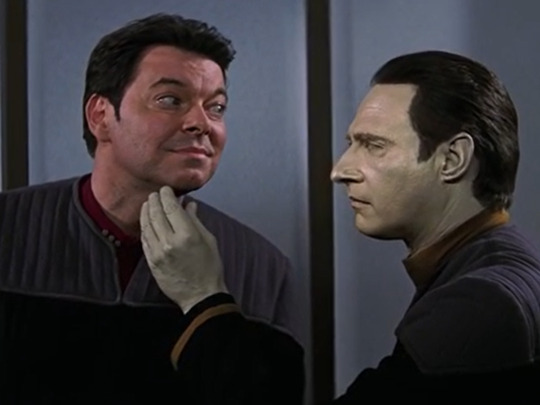
Smooth as an android's bottom It’d be kind to just call Insurrection extremely uneven. On the one hand, we get great speechifying from Picard, as we mentioned last week. But on the other hand, the fountain of youth jokes and the failure to explore whatever the hell was happening with time are just as groan inducing as watching Riker shave off his magnificent beard because he was feeling horny.
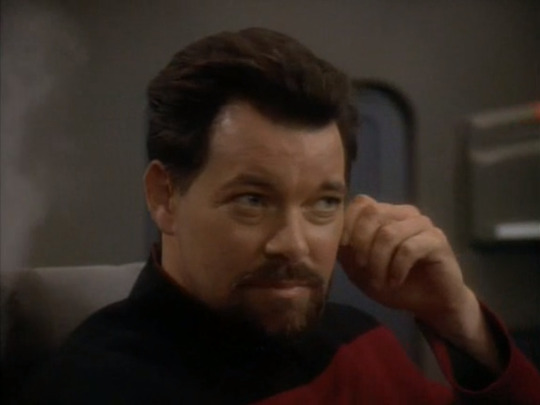
Full-beard Riker > Goatee Riker Because we’ve already decided Tom Riker is fair game, let’s give the transporter duplicate a little bit of guff when he appears in the Deep Space Nine episode “Defiant.” Just… what the hell was his plan? Steal the Defiant for the Maquis… and then what? Kill Kira? Kiss Kira? Make up your damn mind! I’m glad this idiot is stuck in the Cardassian mines for life.
—
It’s time to put our trombones away now until the next time someone requests a recital of “Night Bird.” Join us next week as we have more TNG crewmembers to analyze, specifically the fan favorite yellow-eyed android of the show. We’re also still fighting our way through Enterprise over on the podcast side of things, so keep up with our warp-five watch through over on SoundCloud or your favorite podthing, beam on over to Facebook and Twitter, and toot toot toot!
#star trek#star trek podcast#podcast#riker#the next generation#insurrection#conspiracy#a matter of honor#the measure of a man#the icarus factotr#the best of both worlds#future imperfect#the outcast#schisms#frame of mind#second chances#the pegasus#haven#angel one#the child#time squared#up the long ladder#the survivors#first contact#ensign ro#chain of command#jonathan frakes
5 notes
·
View notes
Text
The following diatribe was triggered by this wonderful analysis by @inklessletter I didn’t know if adding this to the bottom of a reblog was ok (honestly Tumblr really fucks with my brain, and I still get confused about the etiquette, but I have reblogged the post as well because I think it’s awesome).
Not only is this a great analysis, it’s the kind of thing I wish I’d see more of, I love seeing people dissect the show and the characters. It makes me so excited when people really discuss ST in this way and not just ‘my ship is better than your ship’. Bravo, OP. It feels like old school fandom stuff in the late 90/early noughties. It makes me feel young again! Now, on to my diatribe!
I’m a little worried about Steve in S5. Given how we know Nancy does not want to end up like her mother (her discussion with Jonathan in S1 when they’re practicing shooting a gun) there’s no way she should be ending up with Steve. So there’s no romantic end game for Steve in the show, and I always think that’s a bit worrying, BUT there is Dustin, and we could argue it would be weak as fuck to kill both his mentor/big brother characters. I think at the very least The Duffers will tease us with terror and put Steve in harms way, but ultimately my hope is that they will want to go out on a somewhat happy ending and let Dustin (and us) keep the worlds best babysitter.
It still drives me mad that they killed Eddie. It was so signposted from the beginning that every time something was said about running away I groaned out loud. It was so obvious that I genuinely thought they wouldn’t do it. They said Eddie’s arc was over and that there was no way they could have brought him back, which is bullshit (sorry, Steve). I’ve read must be close to a thousand fix it’s now and so many of them had brilliant, creative and most importantly, believable ways to save Eddie. They just didn’t want to, and maybe didn’t see his story as something they wanted to touch on in S5, and that’s fair, but given the kids are starting to look college age now there’s no way we can pick up from 1987, so that’s all story that could have taken place off screen. And even if they didn’t want to do any of that - 2 days later!? Really!? You’re going to do that to us? We got Dustin and Wayne (an amazing scene) but that was it. And “oh god, you don’t know” - El saved Max, she was literally there, how did they not know she was at deaths door!? Sorry, I need to calm down, this gets to me all the time.
If they want blood I think they might off a mid tier character, and my money would be on Karen Wheeler (maybe Vicky if she comes back). If they go further up the chain, Robin, Jonathan, Max, or El would be where my mind goes. Making some heroic sacrifice rather than just succumbing to Vecna.
Despite everything they did to Eddie, despite what they did to us as an audience, I am so hyped for S5, you better believe I’m booking the day off for it!
Thoughts? Opinions? Please share! Also, can anyone help with the tumblr etiquette thing? My brain is still back in 2003 on vbulletin boards, simpler times!
3 notes
·
View notes
Text
On the subject of tankies and blind spots
Tankies often know their "blind spots." It's deliberate, and to really understand how and why they maintain this seeming glib double standard, you just have to observe "Pick Up Artist" culture. Because to be quite frank, tankies and most socialist philosophers just apply being a sex pest to how social activism should work.
The constant guerilla cultural warfare method that was sooooo prevalent in the late 80s and early 90s, when they would be tankies, but pretend not to be, just "start conversations around the water cooler" to spread propaganda or neg things or filibust productive discussions they took personal offense to (and DELIBERATELY disrupt them so conversation they didn't control or the outcome would be the opposite of their desired feelings and thoughts at the end)
With tankies, which in the modern day applies both to people deliberately stanning for Russia or China or insert-socialist-democratic-peoples-harmonious-jubilant-generous-republic here, they come in both the useful idiot form and the deliberately deceptive one. And they're loyal, because to them, the more important part is to destroy competition to their preferred ideology and worry about their preferred ideology after the competition is disqualified.
That's how they work.
To use an allegory of a bunch of men trying to woo a woman. Lets say a bunch of different social systems are would-be suitors for society. The game the way it's meant to be played is you come up, pitch who you are, what you're about, what you can give or offer the lady.
Flowers, chocolate, sweet nothings, dates. Thems the conventional rules of courtship and all that. That's not how tankies/socialists do it.
Oh no. The way they operate is more like predators. They study the book on human relationships, theories on it, how it's "supposed to work" like an alien dissecting the code of an animal, and then with cold hearted audacity, try to deconstruct it and hack it to work for them for their goals. Not to win a heart in a way that respects the recipient and everybody involved, but to win.
So they put on a genuine but phony friendly demeanor, as they're taught to wear as a mask, and rather than try to court who they're interested in, they instead try to be the girl's friend. Become a peer. Pretend and feign they aren't even in the running for courtship and leave things ambiguous and unstated. If accused of trying, they simply go "What? When did I say I wanted that? I'm just standing here." The, "I never said it and you can't prove it" playing coy, anything you can't prove is a baseless accusation game.
From that position, they start playing the role of consultant. Feeding them nice sounding maxims of things to look out for, warning signs, red flags, dire portents. All of them designed to play off key elements of their competition in a game they leave ambiguous if they're even in the running for and give indirect inferences that they aren't. All of them designed to give false positives or warning signs or bad behavior to affect the lady's behavior and make her see threats that aren't there, or assume negative things about a person's character to neutralize the threat of their would-be competition, if they were playing the game honestly.
One by one, competition starts looking worse. "This one looks like an alcoholic. I heard they had a temper, too. You saw the way they angrily responded to Jeffy making a benign statement!" (and now even the slightest bit of aggression from that man looks like the shadow of an angry drunk). "This one seems shifty. I heard he owes debts and is shameless about asking for money." (hard to prove and potentially a long term security risk if true- and so difficult to research and find out if you don't feel like it or don't want the drama.) "That one sleeps around a lot" (probably true in that individual's case. I mean, it's his own fault, but the Tankie Suitor is going to really beat that point like a drum for his own advantage.)
Just being a helpful supportive friend, Tankie Pick-Up-Artist starts giving her criteria all but designed to take their competition out of the running that coincidentally fits them like gloves, invents context by which to damn them in a game he invented with criteria for the rules he wholesale fabricated that he insists so generally are just basic rules and decency and reality that this gish gallup seems incredibly complicated to question or take apart, and having no reason to assume she's being ensnared in a logical trap because of the not-apparent danger or outcome.
And one by one, all the boys in the running are disqualified because she's using Tanke P.U.A's criteria of what a good boyfriend looks like.
All except him. Oh, wow! The precious prince was under her nose the whole time! What a hallmark romance moment! What a GOOD FRIEND. what a selfless, intelligent, totally unassuming good boy!
Tankies are like that, but for social/political systems. They have an idea of what they want and expect society to be by defining society and how it ought to interact with identity and economy, and then they grade systems that aren't their preferred standard by how well they conform to the platonic ideal of the one they ascribe to, faulting them subjectively.
If you tell them their subjective criteria are bullshit and pie in the sky, and they can't prove anything, they shake their jowels and insist upon the righteousness of morals and civil rights and "being a decent human being." And then go on to talk about how capitalism and not-socialism are all guilty of every premature death due to poverty and starvation solely by not being socialist, and that is "way worse than every death done under things that aren't even real socialism!"
Which as we all know, real socialism is when it works, and fake socialism is when not-socialism in the name of socialism doesn't work- then it's just capitalism's fault, either because it's state capitalism or no states around them will cooperate and spoon feed the socialist state by... giving them labor, industry and intelligence... to compete with capitalism.
So tankies will remove the context by which they neg figures in societies and cultures and economic systems they disagree with for moral and ideological reasons but pretend they're just "giving a critique" of them. You know. Through, "Critical Lenses." WHich if you aren't into the arcane of their mental gymnasium, are just the equivalent of a Christian judging everything using the language of Christianity and declaring things objectively evil because their religion says so. Dude, the stamp, "MY SUBJECTIVE RELIGION SAYS THIS" comes right with the holy book. It is the perspective of your ideology, a dogma borne of your arbitrary subjective beliefs, not facts. A glass house constructed of baseless moralism steered purely by preference. Your ideology is not the arbiter on what's right or not, and we will not treat or respect it as universally applicable, or the defacto logical standard. No matter how much you try to blackbox it and deny people access to touch it and be the rudder of conversation. The same way as Christian moralism doesn't get to be "our" moralism just because you enter the conversation talking like Christianity is baseline correct.
They know the sweatshop labor of China and other countries are wrong, but they insist "they're forced to do it to survive ideologically", because of "pressure from the west abusing and starving them." Whereas they maintain capitalism just does it out of greed for "the elite." And if you point out regulation and law exists specifically to prevent that, they argue, "capitalism rends all laws moot by corruption." Which, again, is prevalent in socialist systems as well by nature of authority dictating where resources go.
It's usually not a question of ignorance on the part of the tankie. Usually. Some don't know any better and only stand by it because it sounds right to them but they don't know. Others are college educated, aware of how the legal and economic systems function- or don't- and will still stan socialism and/or communism, because, "it's the moral thing we ought be doing."
And those ones absolutely will sit there trying to stir your passions by telling you half truths to shape your perceptions and hack your interpretation of how things work to get you on that wavelength, because to them and their psychology, the ends justify the means.
And it is that kind of sociopathy that is what dooms socialists and socialism not to work. Because that psychology becomes its own culture and fraternity. That psychology exists to exploit people for their labor in the short term until it's modus operandi of a structure that can FORCE people to continue participating until monopoly of force and monopoly of resources either deprives them from not participating, or corporeally punishes them for not participating- or delivering quota. Baking redistribution in, even just on principle, not on legitimate physical need, because, "it's the RIGHT thing to do." Even if it's wasteful, even if it results in ruin. But they still stan it, because the ideal reality of if it could just work and if only they could just somehow convince or compel people to participate in their fantasy, it could be MADE reality. If only everybody else donated their time and resources to it! They just need convincing.
It's all the bothersomeness of dealing with religious cult sermonizing and blindsiding/blitzing you with theological basis without fully disclosing their beliefs, without the specific church or specific religion. But insisting it's not a religion because, "it's the truth."
1 note
·
View note
Note
You know, I’ve been reading the Ensign Sue webcomic again. It’s very nostalgic, but there was a bit towards the end that I want to touch upon.
Sues are an expression of their creator’s desires, to insert themselves into a story and be loved by the characters. And to that goal, they are willing to warp the canon of that which they profess to love. As such, their “love” is shallow and self-serving, as they don’t accept the stories, characters or even themselves as they are. They need to change everything to get what they want, such as pairing their favorites together or undoing events they don’t like, to make themselves feel special.
I bring this up because of the role fanfiction has played when discussing Houses. This was a game designed for the community to piece things together themselves, per the words of the creators. Translators did mess things up, altering or even erasing the information we were supposed to dissect. But even then, there was still enough left that undermined Edelgard and showed the true character the creators had for her. But rather than continue to work these things out, people instead began opting for fanfic.
The infamous teacher theory came about because the creator is someone who openly admits they project onto Edelgard, and that her actions in the prologue go against their reading of her character. Before, they had owned up and said it was an evil act on her part but tried to mitigate it by trying to argue it’s just Edelgard being smart. But when people pointed out it’s still an evil thing to do, and completely undermines the case that Edelgard is only after the Church, we get this crazy-ass theory trying to portray her actions in a positive light while still ignoring the actual morality of putting a hit on your classmates. This person goes on to argue that Dimitri’s arc is overcoming toxic masculinity, because they didn’t identify with Dimitri’s mental illness like they did Edelgard, but again they project their own self onto Edelgard so they were basically arguing that Edelgard suffered PTSD based on their own experiences. It eventually gets to the point this fan writes a lengthy fic that Edelgard’s fanbase treat as required reading for understanding her character, holding it above the game itself.
But Edelgard isn’t meant to be the player, her experience are her own. She has her own character that this individual and others attempt to overwrite.
We see this also with diehard Claude fans, who believe that Claude was right from the beginning when his arc is about him realizing that he was wrong and amending his ways. They’d rather Claude do the horrible things he does in GW because while it goes against his character arc in VW, it aligns with what those players believe is the right thing to do.
These fans aren’t analyzing the story. They’re asserting a false sense of ownership on it. The fan who made the teacher theory? They try to argue that their analysis of Edelgard is the actual intent behind the character, that the Edelgard resulting from them project onto her is the the Edelgard every player was supposed to see, and when the games own creators actually defined their intent and people could see how completely off the fan was, the fan pushes double-think. That we should ignore what the devs say the story is about, and instead engage in death of the author while acting like they were completely in the right with their analysis of Edelgard’s character and the story.
That’s not how reading works. If you’re going to argue death of the author, your analysis must still be able to stand up to scrutiny. You can’t say the moon of an alien planet is neon pink when the text says it’s a lime green. And this is what we get into.
Edelgard’s ideals are presented as toxic when they’re actually examined, or we get lore drops that completely contradict her claims. Even with the translation changes, Edelgard is still shown to be a liar with hints that what she told Byleth was intended to sway them to her side. The story is still saying Edelgard going to war was because TWSITD manipulated her into doing so, so that she might purge the surface world of what they refer to as “beasts” (Read: any non-Agarthan) for their own salvation, but we also get Edelgard using them to further her own goals. And those goals aren’t meant to be positive, SS/VW/AM show that even taking Rhea out Edelgard seeks conquest and that removing Rhea was just a pretense.
And with the devs confirming that they created Fodlan to support Silver Snow’s story, even using Buddhist, Confucian and even Christian symbols to mark it as the good path, the depiction of Edelgard as an enemy holds more weight than her as an ally, as Flower’s subtext is all about not she should not be trusted.
But that’s not what the fans want. They want “moral grey,” and throw around “unreliable narrator” in order to justify saying the person who lies to her entire army and keeps them in the dark to her real goals is the good guy. Because they believe Edelgard to be the hero, everyone else is the villain and “moral ambiguity” is just a means to excuse her actions as they want to treat the story as black and white, just not in the way it was meant to be.
If the player acknowledges Edelgard’s agency, it means it was her call to do bad things. Things they don’t want to admit she did. Likewise, we’ve seen takes all over the spectrum about what her reforms are actually supposed to be rather than, you know, listening to what her beliefs on how society should work actually are, because that would mean she’s fighting for things the fans don’t agree with. Hell, that was the case with the translators who toned her ending down! If we have to deny her agency, her actions, and what the intent behind those actions actually are effectively what these fans are saying is that there is no excuse for what Edelgard does, so they resort to fanfic to make her the hero who does what they want her to do. They even resort to trying to claim the Agarthans are the ones we should sympathize with despite, you know, being a bunch of racist Hot Topic rejects.
I’ve said before that Edelgard tries to play the player, using the support system to try and sway them to her side much like Byleth recruiting students. The thing is, the players view Edelgard as their puppet. The one who would serve their goals, their beliefs, and do what they want her to. The players are acting like the Agarthans, putting Fodlan in Edelgard’s hands under the mistaken belief they can control her.
it annoys me so much when people say "edel had no other choice" as a thought terminating cliche. like even IF that were true, how one goes about that is still a characterful thing that gets minimized to "so it's not her fault stop being mean to her she just did what she had to". like. does she feel regret? does she apologize ot the people she's hurting? does she view it as righteous? who knows, becuase the argument is only ever used as a "stop being mean to my wife" line and not a character thing.
Yeah cuz like. Okay so let's say that starting the war was absolutely not her fault because xyz circumstance robs her of any substantial say in the matter.
What about using Demonic Beasts? What about her siccing her army and different set of Demonic Beasts on her own "friends" so that she could make more Demonic Beasts? Stealing from a gravesite to do so? What about starving her citizens, and being the only lord TO starve her citizens in their route? What about killing Judith as she ran away from her? Hell, invading the neutral Alliance in the first place? What about helping the Death Knight get away with stealing Flayn if 25 turns pass? What about saying nothing about Kronya even after Solon reveals himself at Remire? What about giving Jeritza a hunting ground to enable his bloodlust and not, like. Professional help?
She couldn't even mention a means she's working on to do anything about her starving citizens? Did she have to blame Claude (and everyone really) not immediately bowing down to her as to why the Alliance was violently invaded, and not her violent invasion being the reason it was violently invaded? What about persecuting Church followers who didn't do shit to anybody, did she have to do that shit too? Never freeing Brigid and instead stationing her men there on her route and sending Hubert there off of it; that was forced on her too? Taking Byleth's credit during the siege instead of letting them get the recognition they deserve - what, just, fate forcing her hand once again?
Are we really going to sit here and say because the war "needed" to happen, Edelgard was forced to do literally all of that (and more)? That because Edelgard was "forced" into war, she was also forced to do literally anything involving the war?
Like you said, her stans saying that she "had no choice" but to start the war does nothing to say anything about her as a character, because they also reject everything else she did regarding her war as having anything to do with her agency. They treat "she had to do this" as a means to protect the moral purity they want her character to have so they don't feel bad rooting for the villain to win, not as something that goes on to mean anything for her.
And I'm not asking for her to save literally every single person ever from any harm ever to prove her care about not going to war exists, I'm asking for LITERALLY ANYTHING. Because she quite literally does nothing to mitigate harm from anybody in this war, and regardless of whether the war was "forced" on her hands or not she absolutely could have done something to make sure her people suffered as minimally as possible. Which damn sure isn't seen in her hiding behind them as she sits in her throne room (a thing Dimitri and Claude absolutely don't do, with either similar or less time to prepare to protect their people). Or starves them, a thing uniquely said about her route (as literally all the other ones have the army go with lacking food supplies). Or allows Thales to conscript them under threat of death. Or openly saying that she thinks weak people would only stay weak after her war because they're "too used to relying on others" - because when her war takes everything away from people, it'd be THEIR fault for staying weak, which is *chef's kiss* so kind and caring amiright guys. Definitely shows off that she understands and/or cares about the ramifications of her war onto the people, and not that she has her head shoved squarely and firmly up her ass.
What does it meaningfully mean for the war to not be Edelgard's fault, if she's not going to do anything to indicate that she cares about other people enough to want to not force war on them? Hell, when she very explicitly shows she doesn't particularly care about how it'd affect people, if it affects people in a way that doesn't align with her beliefs? When she very explicitly says she's perfectly willing to sacrifice her people for her higher cause, and then goes on to sacrifice her people for her higher cause? If she doesn't even try to help others because the war was forced on her, that at best makes her one of powerless victim or uncaring defeatist - neither of which fit the resolute caring ambitious revolutionary they paradoxically also want her to be. So, again, what does it actually mean for the war to not be a result of Edelgard's agency, if she regardless of that still shows callous indifference to those harmed by the war?
It's a question no one who posits this about Edelgard is able to answer, because as you said, it's not meant to be anything more than a shallow defense against her own actions. Letting Edelgard have even the slightest smidgen of agency in her own actions means accepting that she is a massive fucking penis. A huge gaping asshole. A plain ol' jerk. Which again! Is INFINITELY more engaging to watch than this marionette strung along by literally everyone around her into "looking" like a villain, only being her "true" self when she's feeding kittens and dwawing her cwush and burping her googoo gaga babyass girlfriend they also tend to make (f!)Byleth over her shoulder
53 notes
·
View notes
Text
Vyn's supposed "Red Flags"
So! I know Vyn is widely regarded as the "Red Flag" character, and it has always kinda ticked me off as I don't see these "screaming red flags" (and I'd like to think I'm fairly decent at spotting them.) However, after reading chapter 3 of his personal story, I will say this:
Vyn has trauma red flags, not toxic red flags.
For this character study, I'll be referencing specifically Vyn's personal story chapter 3, main story chapter 2, and a couple cards. (And for chapter 3 spoilers as well as length, I'll throw it under a cut)
Where to begin? How about discussing that the entire beginning of Vyn's personal story chapter 3 really set up trying to frame Vyn for being the PUA leader and making him seem as shady as possible. They tried to paint him in a skeptical light, with him hiding his actions from the MC and him challenging her as to if she thought he was the PUA leader or not. You question what his motives are here, wondering if he's trying to protect the MC by doing this then being resigned to the fact she'll hate him when that post came out. However, it is not until the end we learn his true intentions: he orchestrated this whole case to challenge and test her. The purpose was to see how she would act in the face of accusations against him: a friend. Would she act emotionally? Would she act with logic? Would she hesitate? Would she be conflicted? He wanted to see all these actions from her.
This coincides with main story chapter 2. We all remember the CG with thunder in the background as Vyn has a chat with Artem about not wanting the MC to be so protected. They really set Vyn up here as the "sketchy" character. (And for a while, I thought they did him really dirty here, but after reading Vyn’s chapter 3, I no longer think so.)
And then we can make a vague reference to his "False Tears" card where he "manipulates" the MC into giving him attention, and he just generally LOOKS shady as hell.
When all put together like this, Vyn sounds pretty toxic, right? To which I say, "it depends." If this was ALL there was, then yeah, I'd agree, but it's not. There's a lot more to it than that.
Let's start with dissecting the end of Vyn's Chapter 3 and moving up from there.
In Vyn's Chapter 3-15, we see him talking with Captain Morgan about Rosa. The duo are having a very interesting discussion about whether Rosa should be more protected or not. Captain Morgan is not wrong to think this, making sure Rosa stays out of the really dark parts of society. It's thoughtful of him. Where as Vyn, on the other hand, launches into a seemingly sketchy metaphor about breaking her wings so she can learn to fly despite the pain. Only once he elaborates on this can I truly understand he's not wanting to purposefully cause her pain. He's wanting her to face those dark sides so she isn't ignorant of a darkness that is seemingly foreign to a very bright young lady like Rosa so that she can grow in understanding. None of it is done to harm her but rather because he cares enough to want to see her grow.
And maybe this is me self-projecting a bit here, but this feels like a very "post-trauma" way of thinking.
Trauma survivors who are at least part-way through healing begin to understand that the darkness is not a fun place to be, but at the same point, the learning curve of it has shaped their minds in a far different way than someone who grew up in a healthy family. They are jaded, scarred, skeptical, and the end up pulling from both the darkness and the light for their survival.
From what I have gleaned, Vyn grew up in a very broken home. I'm trying not to self-project here, but I'm going to for a moment. As someone who grew up in a well-off albeit abusive family, the abuse isn't the physical kind; it's emotional and mental. People with money and power tend to want to get their way, so manipulation is big and so automatic they don���t even realize what they’re doing. And sadly, I would say that some genuinely do this behavior out of love not realizing that it’s toxic and damaging.
Worse yet, I feel this kind of abuse is more subtle because it's not that "obvious wrong" of being beaten or substance abuse. And most of the time, it doesn’t even seem wrong on the surface such as blatantly threatening or harassing. Instead, it's an underlying factor that's always there, the monster hiding under your bed kinda thing. You learn to tread carefully because you don't want to wake the monster. The adults in control want to keep that control, whether it's through money or power. And it tends to be in subtle steps up in intensity that you don't notice until it's too late. So life becomes a mind game to navigate. Who are you talking to? What’s their limit? How bad will their abuse/manipulation get? How can you avoid it while also not caving? Considering the way I believe Vyn perceives and interacts with the world, this abuse theory already begins to check out.
Taking a slight detour to his "False Tears" card specifically, this already begins to further confirm that he was subjected to emotional abuse. Because if he grew up in a place where emotional outbursts got him in trouble, then his emotions get suppressed and logic becomes his best ally. (here's where I slightly self-project again) You subconsciously teach yourself emotional outbursts are irrational, and you actually begin to get upset with yourself for having these emotional outbursts. When you heal, you begin to walk this fine line of "emotional outbursts are okay in certain situations, but you're tough and can take a lot so it has to be really bad." So when Vyn "acted out" to get Rosa's sympathy, I feel like he was walking that line. He was hurting and so he "made a show" of being broken because he felt like he could get away with it, trying to convince himself in his mind that an emotional outburst at this time is rational Lou justified.
The sad thing is that the situation was already justified. Vyn didn't need to act out to garner Rosa's sympathy as she was very willing to help and support him from the beginning. His "false tears" were him allowing himself a moment of weakness to garner sympathy NOT in a toxic manipulative way. He wasn't trying to get Rosa to feel sorry for him. Rather, I feel like his actions were more more akin to a timid child saying "mommy, this situation really really hurts, so this means I'm allowed to have a hug now, right? Please say yes.” rather than a haughty "yes, I want you to feel sorry for me. You’re dancing in my hand now.”
The other card I'd like to bring up is his "Mended Heart" card, where it's referenced that he throws out broken things. This is also referenced in chapter 3-12 where Westley is trying to break Vyn down by saying he can't stand broken things. Everything has to be perfect. I have discussed this once before that I think Vyn grew up in a rich, perfectionistic household. This is where he gets his "broken things are useless" mentality. I feel like this is both subconsciously learned and was taught manipulatively. When you have money, things are easily replaceable, and since rich people (particularly royalty, as seems to be Vyn's case) can be among the most judgemental, broken things are useless. You have money? Why save the broken thing when you can get a thing that isn't broken? This is how Vyn subconsciously learned this.
The second way, of it being taught through manipulation, is the "standard" how parents expect perfection, punish a child for anything less than, and since a child is desperate for their parents' attention and perfection is the only way they get it, they learn to become perfect. And if Vyn was punished as opposed to being ignored for not being perfect, then that would further take an affect on him. Henceforth, he has learned to put on a front of being perfect because it has become so ingrained in him that not presenting as perfect will get him in trouble or looked down upon. And he can’t stand either of these seeing, as a trauma victim, he is desperate to prove he has value. Why do you think he’s constantly rubbing the two doctorate degrees in Artem’s face? “I have two doctorates. I hold more value than you do.”
On that same note, in Vyn's chapter 3-12, when Westley called him out on his "low self-esteem", I think he was partly on the mark because growing up in abuse like that really does do a number on you. As such, I think that Vyn's startled reaction was a bit true. However, once you've been through abuse, you are determined to never let it happen again. And since you've been through the shit and know how to play the game, you play it right back. Whether Westley was right, wrong, or somewhere in between, Vyn would never let that man know and instead twist out of by pricking his weak spots. Never let an abuser get an upper hand on you, after all. Fool me once, shame on me; fool me twice, you'll live to regret it. And Vyn doesn't take shame in the first place.
SO! With this, I feel it's safe to assume Vyn was subjected to this mental manipulation and emotional abuse, which then begins to shed a different light on all these seemingly sketchy situations. Starting with what he wants for Rosa.
He sees Rosa as a highly competent attorney with a lot of potential if she is allowed to grow. But as witnessed in main story 2-2, he tells Artem that Rosa won't truly grow if she's just kept out of the dark and protected like some house plant. I feel like the best flower analogy is not real rose vs fake rose (although I know they did this for the “Rosa” analogy.) Rather, he wants her to be a dandelion instead of a frilly flower, one that can grow in any conditions, concrete or soil, rain or drought, and you have to bring out the weedkiller to maybe take her down. He wants to make her strong, and in his mind, strength is not only facing the light but tackling the dark.
So, back to 3-15, this is what he means by his eagle analogy. He wants her to face the dark even if it hurts her. But at the same time, he's not so heartless or cruel to throw her out to the sharks without a lifeboat. He's fully intending on holding her hand and guiding her in there, allowing her to face it, encouraging her to bear it before pulling her back out into the light again. He's a psychiatrist, he'll be there to track her mental state and do his best to control the environments she is in. He'll protect her from any real danger, but he'll let her face the garbage so as to let her learn.

And now the fact that he is the one to take her blindfold off in the promo image suddenly makes a WHOLE lot of sense. Of the four men, he is the “least protective.” I'm not saying he isn't protective of her, because he is, particularly of slander against her or her reputation. However, Luke would literally rather die protecting her than let her be exposed to this darkness. Marius (I know the least about him, sorry) gives the impression he doesn't mind if she faces some things but is willing to save her at the drop of a hat. And Artem, as her boss, is second most willing to let her see everything so she can learn so as to remain impartial, but he also has a "decency" limit and a more fatherly, protective instinct to care for Rosa. Vyn, though, values true growth even in the hardest of conditions, and while he doesn't necessarily want to put Rosa through it, he knows she'll only shine brighter for it and wants the best for her.
So when put like this, I'm not saying all his toxicity disappears in a snap. I think that abuse survivors tend to be pretty edgy and may walk a finer line between love, tough love, and abuse than what most people are used to. And depending where in the healing process an abuse survivor is, they may think they're walking a line when really they're in one camp or another and don't realize it. Henceforth, I won't deny that people with trauma can have/exhibit toxic traits, but they tend to become fewer with healing and time. Furthermore, they are not toxic necessarily for being purposefully toxic but rather because it's a residual from trauma and they don't realize they're doing it.
The BEST example of this is Captain Darius, bless his heart, warning Vyn about limits. Because I have a hypothesis that people like Vyn (like me) who grew up in trauma have no idea what a "limit" is. We push ourselves hard, we want others to do the same, and we don't recognize where the limit lies until it's too late. Then we say "okay, I won't do that again", but we do, again and again and again because we get frustrated we can't go further. We've been through shit, we're tougher than that, right? We bore pain that didn't stop even when we hit our limit, we hid it, so since nothing could be as bad as that, I don't think we know where our limits lie. And at times, I don't think we know the word "limit" exists. So that might be a toxic "red flag" for Vyn, but it is not a malicious one, it might not even be one he's conscious of, but rather something brought about by trauma.
After all this, I still think it's fair to say Vyn is still the "sketchiest" of all the boys, but not because he's purposefully toxic and instead as a result of severe trauma. And people with trauma do tend to walk a lot of lines and will cross them without realizing it because their normal is not a "normal" normal. Sometimes, we need reminders of "you crossed that line, don't go there." and we have to go, "Oh, yeah, right. Society normal."
So my hopes for this Rosa/Vyn romance is a lovely counterbalance. I'm all for Vyn allowing her to face shit and get exposed to the darkness as long as Rosa is his check and balance, reining him in when he goes too far as well as being a safe space for him to express his true emotions and continue healing. And I think that might be the case here. Specifically referring to Vyn's Chapter 3-14, when Vyn asks Rosa about what would happen if she saw her lover's ugliest side. He seems surprised that she'd stick by his side and "weather the storm". I feel like he fully expected her to abandon him if he showed her his ugliest side, his dark secrets, his trauma, because "broken things are replaced", right? So you pretend to be perfect; you pretend to have it all together; you're better than that. You conquered the hell already, the worst is behind you. But that's not how it works. Vyn knows he has an ugly side, no matter how much he wants to deny it. (one that we sorta caught a glimpse of in "False Tears".) So I think one of his biggest fears is being abandoned if anyone found out he was "imperfect".
So when Rosa was all "nah, we weather this together. I won't give up my life for him, but I'm not gonna leave him alone," of course Vyn is surprised if this is the first time he's felt such genuine warmth from a human being he has a non-work related connection with. If this was all he'd ever known, either abandonment or loss, then of course it would be surprising for someone to dump this kind of selfless love on him. Which, when put this way, really shows how fragile Vyn is under his seemingly indomitable exterior. I feel like this poor man puts on a show of strength when in reality, I think he's just a couple carefully placed hits away from shattering. Just as long as Rosa is there to pick up the pieces, it will be okay (and maybe even for the better) if he does.
#tears of themis#vyn richter#vyn richter analysis#This grew longer than I expected#Also heavier#this poor man#Also I wrote this then edited it once so hopefully it makes sense
482 notes
·
View notes
Text
What We Inherit - Ushijima x Reader
Summary: Ushijima’s childhood has a greater effect on him than he lets on and you only just start to realize once you meet his parents. (~2.6k words)
Warnings: divorce discussion, angst with a soft ending, character study of a sort?, sfw
A/N: Ushijima needs more background so here’s me trying to grasp at straws for an understanding of his character.
---
Ushijima favors his mother, you realize suddenly.
Not favor in a preference sort of way - while you can tell he’s an attentive son (to the point that you are worried he is too much so, stiffer than usual and mildly anxious), you realize the reason why your gaze lingers a little too much on the details of her face and the way she walks when she rises out of her seat is because she is so much like him. Or rather, he is like her.
For some reason, this sudden recognition is groundbreaking.
After all, it’s odd to compare this small, unassuming woman to your boyfriend who frankly embodies strength, but the links of blood are there, and obviously so. You can see him in the same hazel eyes that seem to pierce through you, the smile that is soft and polite but restricted, and even the way she walks, back straight and shoulders squared in confidence but touched with a feminine grace.
When your eyes blink and reopen, he looks almost exactly like her.
“You took a long time to visit,” she admonishes him once he returns from storing away the fresh fruit he’d brought as gifts to sit beside you in the living room. Her tone is not exactly harsh but it’s not exactly teasing, and she doesn’t look at him while she speaks - she’s too focused on you. Before you can take the time to further dissect her sentence and decide if the tension you’re feeling in the air is imagined or not, she shifts gears.
“Is he good to you?” She asks you suddenly, her eyes that are his not leaving yours as she brings a cup of perfectly tepid tea to her lips.
It’s such a direct statement that you’re startled by it. It gets to the crux of your meeting without need for pleasantries; in fact, she hasn’t asked you anything past your name, and you wonder if it’s because she doesn’t care, if she plans to ask later or if Wakatoshi has told her all she needed to know about you.
You immediately eke out a “Yes, of course,” however, because it’s true. He is good to you. He’s been nothing but good to you for the past couple of years, and even though you’ve only been dating officially for the past year, he’s promised you he will continue to be this way for as long as he lives. It’s almost irresponsible that he says something so definitively, but you trust him with all your heart.
She seems satisfied with this answer because she smiles and sets her teacup on the table with barely a sound. “I’m glad.”
Her smile is like his too, you take note. When you turn to glance at Wakatoshi, he too is smiling down at you, filled to the brim with pride and affection.
---
The Ushijima family home had started off intimidating but had become warm, much like him, as time passed. That ease began with his mother relaxing out of a kneeling position into a seating position and finally asking you about yourself.
It turns out Wakatoshi had spoken to her about you, although some of her details were incorrect, and for with every clarification you ended up making, you could see his ears grow pinker and pinker by the second.
His mother, of course, didn’t notice, her eyes growing wide and nodding intently as you gave her more and more details about your life as though she were hearing things for the first time.
“I told you all these things, Mother,” he finally intercepted when he’d felt that the constant barrage of questions had started to overwhelm you, although it seemed he was the one being overwhelmed by the exchange between you two.
You gave him a glance in surprise, as did she, and then she nodded, folding her hands together, the stiffness and extreme formality returning slightly to her demeanor. It made you a little upset, the way she seemed to retreat back into her shell, and you pouted ever so slightly at him.
Picking up on your pout, his mother finally teased, “Wakatoshi-kun’s always been serious like that, ever since he was a child.”
It was a bit ironic to see this very poised woman also call her son ‘serious’, but you smiled weakly in response, reaching over to hold his hand.
There you noticed again that he was stiff even if his face was unreadable as always. For a split second, you wondered if there was a flash of resentment you saw in his features, but you decided that that too, you had imagined.
“I suppose I can show you some childhood photos. That’s what’s normally done at meetings like this, is that not so?”
Without waiting for an answer, she rose and whisked out of the room, leaving you and Toshi to each other.
Once she was out of earshot, you squeezed his hand tightly.
“She’s very nice, Toshi, you should have brought me sooner,” you whispered with a soft playful pat on his shoulder. He didn’t offer much but a soft hmph in response, so instead you scanned the room, taking in the sparse decorations in the living room.
Most of the decor was traditional and minimalistic and separating from Wakatoshi, you gravitated towards a display case in the corner. As expected, trophies and ribbons from his matches were proudly shown here along with other trinkets and knick-knacks.
What surprised you was a picture slightly tucked away in the corner of Wakatoshi, much smaller, smiling and clearly as carefree as any well-affirmed child would be, resting comfortably on the shoulders of a then-young man with a matching grin. Next to them was his mother, also younger, her hair loose and flowing, unlike the semi-neat bun she wore today, and just as genuinely happy as they were. Her arms wrapped affectionately around the man you presumed to be Ushijima’s father, and her eyes were almost closed, squinting cheerfully in the bright sun.
They looked so happy, you remarked. Even if it was in the past, it was a nice memory to be brought to the forefront, not something to be stashed away.
Unconsciously you reached for it for a closer look, not realizing your boyfriend was behind you, peering over your shoulder.
“I found the album,” His mother announced, peeling your attention away from the snapshot in time. You still had the picture in your hands when you quickly went back to sit, and jokingly, you pointed out:
“I think I found a good one already!”
His mother took one glance and for a split second, you could see her placid demeanor break, but then she let out a soft chuckle without further comment, instead opening the heavy photo album to gush about her perfect son.
---
The short-lived shaken expression on once-Mrs. Ushijima’s face haunted you longer than you expected, and you found that you were still thinking about it long after you had left the home and were back home with your lover.
“Toshi,” you finally ventured to ask, now under the cover of night as you lay in bed together just moments before sleeping. He moved ever so slightly, his heavy arm shifting from draped over your shoulder to over your midsection to make it easier for you to turn to face him, which you did promptly in the dark. “Did your mother ever consider getting remarried?”
“I don’t think so.”
You paused, carefully choosing your next words. You wanted to ask him if what you’re sensing, he’s sensed, this very small bit of remorse that you picked up. Maybe it was too much to assume, so instead you end up saying nothing.
He picked up on your need to say more and interlaced his fingers with yours, pulling your arm up so that he could press the back of your hand to his lips.
“I appreciate your concern, but I’m not upset about them, not at all. Besides, step-siblings might have made things complicated.”
What you wanted to ask was, does your mother regret it?
---
A year and a half later, in sunny California, you’re seated side-by-side with your Toshi and before you is a smiling man who looks every bit as cheerful as the man who carried his son on his shoulders in that single image burned in your memory.
Again, you realize Ushijima favors his father.
Admittedly, not as much as his mother, but you still see him in the broadness of his hands, the animated and focused way in which he talks about work, in the way he listens intently to your every word, although his eyes aren’t as sharp as Ushijima and his mother’s - they’re soft, round and brown and they’re surrounded by the beginnings of crow’s feet.
Ushijima is noticeably more relaxed around his father, you note, but the same bit of tension fills the warm air when Mr. Utsui asks you when the wedding is.
“We haven’t decided yet,” he cuts in, speaking for you now even though you had reached a steady pattern of conversation with his father. You’re a little bit annoyed at the curt way he interjects, but especially at the fact that he does this, when you’ve been not so subtly talking about marriage for a couple months now.
In fact, it’s when you shift from talking about your future together in grand terms (let’s buy a house, let’s have three kids, maybe a dog) and instead specifically bringing up when to be wed that you realize he cares more about his parents’ failed marriage then he lets on.
A ring didn’t stop them from separating, he insists. To you, it sounds initially like I don’t know if I want to marry you, but you know in the depth of your heart that he would choose you over himself any day.
But the concept of marriage itself bothers him and while you sympathize with him, it’s hard for you to let go of the idea of a ring, a pretty white dress, and taking his name.
It’s with that same premise that he’s visibly irritated by his father’s abrupt joke, and you and Mr. Utsui are both taken aback when you see the visibly irritated expression on his face, but his dad laughs loudly to defuse the situation.
“Jumping the gun there, aren’t I?” he says, reaching across the table to affectionately pat his son’s shoulder. “You just look so comfortable together! In fact, it reminds me of your mother and I back in the day.”
The statement meant to palliate him makes the situation all the more precarious.
Really, it’s careless the way his father says it so easily, and you can see the comment has hit something deep inside your Toshi by the very slight tension you see in his jaw and the way his eyes narrow. It’s as though, in a single sentence, his father has both denied his childhood pains and plainly uttered a curse onto your relationship, and Wakatoshi won’t allow it.
“Please refrain from comparing us to the two of you in any way from now on.”
His words are controlled, precise and seething, and you wince reflexively. The sugary sweet, half-eaten stack of pancakes in front of you no longer seems appetizing, but you pick off a blueberry with your fork and eat it to give you something to do while your heart pounds.
What will his father say in his defense?
“You’re right,” Takashi says - he wants you to call him by his first name because you are important to his son - with an understanding nod, his eyes still kind despite the fact that his son’s look is almost menacing, even if he doesn’t intend to be.
“You’re not at all like us.”
---
In the quiet aftermath of the tense brunch date, you finally decided to give up on the idea of a wedding.
You could argue that there was always therapy, but you weren’t sure to what extent the old wounds inflicted so early and so neatly tucked away could be healed with talk and introspection. No longer were they simply wounds but reminders of the following:
Marriages fail. Love doesn’t always last.
You inched a little closer to him as you walked together on the beach through the night, unsure if your increased need for closeness was related to the chill of the small breeze picking up from the waves or because you were starting to wonder if Ushijima’s father was wrong.
What if you were the same? What if you did end up like them? Thousands of miles apart, with uncomfortable painful memories of each other and a son who repressed his resentment… There was no way to know, was there?
You stopped suddenly, your heels digging into the sand as you broke the pregnant silence between you two.
“Toshi,” you murmured softly. Still holding your hand, he turned to face you, his eyebrows just slightly raised as he watched you in the moonlight.
“I won’t talk about marriage anymore. I get it now,” you finally decided, your voice wavering ever so slightly unlike your steadfast resolve.
He looked into your eyes, again trying to parse out what you were feeling from the slight knit in your eyebrows and the very slight tremor in your hands.
“It’s cold,” he replied simply, taking off his hoodie and putting it around you. “Here.”
You frowned as you pushed your arms through the sleeves, your hands curling into tight fists. If you were going to bend like this, he should at least acknowledge you!
“It’s still important to me, and I think we would be different, but I understand your feelings,” you insisted, staying in place.
He had to give you something, anything. It wasn’t selfish to ask for a little bit of credit, was it?
You saw him flash a small smile, then lean over to give you a kiss on the cheek. Before pulling back, he let out a small laugh, the first since hours earlier.
“You don’t want to get married anymore, sweetheart?” He teased, his arms rubbing up and down your shoulders, and your frown grew deeper. This was an odd time for one of his jokes.
“I’m being serious!” Your voice came out whinier than expected, to the point that you were almost embarrassed, but it only made his smile grow wider.
His hands moved from your shoulders to cup your face, making sure that all you could see was him, speaking sincerely to you under the night sky.
“That’s too bad because I bought a ring.”
Your heart stopped.
But then it restarted, and instead of shivers, a new warmth seemed to run throughout your entire body with every new beat in your chest.
“W-what?”
“I want to marry you.”
I want to marry you. The words seemed to bounce around your now empty head, making a ruckus you couldn’t exactly think through.
“But you said…?”
“I don’t need a ring to prove that I’ll love you forever, but if it’s important to you, I’ll work hard and buy you a ring for every single year we are together.”
He must have picked up the habit of saying careless and deliberate statements from his father because you were now choked up with tears that you couldn’t wipe away because your hands were too busy resting on his that held your emotional visage.
“T-Toshi…”
“We’ll be different from my parents, ____, I swear.”
You felt as though your heart would burst, so all you could do was nod. It didn’t help that his eyes seemed to shine far too much tonight as well. Was it just a trick of the moon or was he trying to convince himself too that he wouldn’t do you wrong?
“It’s true that I don’t have the ring on me, but I want to formally ask you today before I dare put a ring on your finger,
Will you marry me?”
Again you nodded, tears finally rolling down your cheeks in relief, because the answer had always been yes.
And you knew for sure, that the two of you would fight like hell to be happily married after.
#ushijima x reader#ushijima wakatoshi x reader#ushijima#ushijima wakatoshi#ushijima imagine#haikyuu imagine#sfw#fic: what we inherit#mae.writing
537 notes
·
View notes
Text
The Evolution of Will Graham’s Darkness
This meta is mostly written for new viewers who find themselves confused by Will as a character. I’ll incorporate some bits of analysis I’ve written before into it. Let’s start with a thesis of a sort: Will is a dark character who had this darkness from the very start, even before his encounter with Hannibal: he was terrified and disgusted with it, but after meeting Hannibal, slowly, he began to embrace himself, getting bolder and bolder in his violence.
**Before the show**
Will initially tried to get into the FBI but he didn’t pass the tests. It’s revealed in E1 of S1 when he’s ambushed by Beverly.
Beverly: Never been an F.B.I. Agent?
Will: Strict screening procedures.
Beverly: Detects instability. You’re unstable?
At the same time, Will became a police officer, working in the Homicide department. These decisions show that he's been stubbornly and rather hopelessly drawn to darkness, seeking ways to interact with it while remaining on the side of law. However, he had to leave the police, too, because he was incapable of pulling the trigger even when his life depended on it. He preferred to allow himself to get stabbed rather than to fight back and kill someone, which points to him having very serious issues with his violence. He knew that once the door in him opens, it might not close again, that if he kills or harms another person, he might be unable to stop (this is proven when he shoots Hobbs and then immediately tries to kill Stammets).
And still, Will chooses to stay close to darkness, only in safer ways. He becomes a teacher in the FBI Academy, letting himself delve into the ugliest cases from a theoretical perspective. This constant pull and struggle leave Will lonely and hostile to everyone. He avoids eye contact with people; Jack’s first impression of him was that he’s rude and arrogant (when they clashed about the name of the museum). Will is rude and haughty with his students, too – but more about it later. Alana refuses to stay alone in the room with him, thinking his instability is too fascinating and she might want to dissect it. Will has no friends; he lives in isolation with his dogs, someone who would never judge him. There are a lot of rumors about him going around, and most people don’t like him (based on Price’s and Zeller’s initial reactions as well as their later conversations on this topic). Will is lonely and pretty miserable.
S1
The first real words we hear from Will are:
Will: Everyone has thought about killing someone.
It is very demonstrative of his personality. We also get evidence right here that Will is drawn to darkness primarily, not to the idea of saving lives (although the latter helps him feel better about his urges). He delves into the minds of killers even when he isn’t involved in the investigation. He had no other reason to explore the Marlows’ murder like he did at the start of the episode, when he was simply teaching students. It’s proof that he willingly craves contact with violent and disturbed minds — it’s not like he actually tries to solve this case for real, he just imagined himself there.
Will’s first conversation with Hannibal speaks volumes about who he is — because Hannibal senses it seconds after meeting him.
Hannibal: Do you have trouble with taste?
Will: My thoughts are often not tasty.
Hannibal: Nor mine. No effective barriers.
Will: I make forts.
This exchange has Will confess that his thoughts are often dark and that he dislikes it. To hold this darkness at bay, he literally builds forts around it, not letting it spread to other parts of his mind.
Hannibal: Your values and decency are present yet shocked at your associations, appalled at your dreams. No forts in the bone arena of your skull for things you love.
Hannibal almost directly calls Will out on his struggle with his inner darkness. He’s saying that he sees it, that he knows it’s there, in Will, in his mind, and Will is very disturbed by this — because Hannibal is right. The script even explicitly backs it up:
Hannibal has just described Will Graham to a letter.
Will is immediately wary and hostile, and he ends the conversation with snappy,
Will: Please don’t psychoanalyze me. You won’t like me when I’m psychoanalyzed.
What does it mean? It’s simple: Will assumes that Hannibal is a typical psychiatrist who wants to dissect him, so he says that once it happens, Hannibal won’t like what he finds (darkness and ugliness Will carries inside).
His hostility to Hannibal lasts up until the moment when Hannibal acknowledges him as a predator and shows approval of it. This is how it happens: Hannibal tries to subtly tell him that it’s all right to be who he is, hinting that they are the same.
Hannibal: You and I are just alike. Problem free. Nothing about us to feel horrible about.
He’s obviously talking about their darkness, but Will doesn’t react, so Hannibal continues. He tells him that Jack views him as a fragile tea cup, and Will genuinely laughs, amused by this (which is also very telling). Then Hannibal says:
Hannibal: [I see you as the] mongoose I want under the house when the snakes slither by.
Will grows quiet after this, and then his interactions with Hannibal become much more relaxed. Will takes him to search the property and even bothers to explain how they reached their conclusions and what they are about to do. Him grumbling, “What are you smiling at?” shows a much higher level of familiarity they now share. Something in Hannibal’s words made Will open up a bit, and everything indicates that it’s the acknowledgement of his predatory nature that played its part in it.
Will kills Hobbs by shooting him 10 times. This is his first kill, one he’s been trying to avoid for so long, ever since his police work. It’s not surprising that Hobbs haunts him later because his death became a breaking point for Will. A door did open in him, and he was unable to close it again.
In E2, Will is distraught. But first, we get a glimpse into how rude and insensitive he generally is. Look at how he treats his students. He tersely thanks them for clapping and then snaps for them to stop. He devises a little malicious test for them.
Will: It’s [Hobbs’] resignation letter. Anybody see the clue?
A few hands go into the air. Will ignores them.
Will: There isn’t one.
He looks so long-suffering with them, as if they are idiots. The fact that he asks a question, waits for people to think and raise their hands, and only then he tells them there is actually no answer is petty at best. He also admits to Jack that he doesn’t consider lessons socialization because he doesn’t have to actually talk to students, he talks at them. Not good for a teacher or even for a person who works with other people like this.
But Will has more serious problems. He keeps imagining Hobbs, and after his messy kill, Jack becomes worried about him. He makes Will go visit Hannibal for one-time evaluation. Will is naturally not fond of the idea, but he and Hannibal have a pretty personal talk. Hannibal ends it with an even more explicit hint at Will’s own darkness:
Hannibal: And Will… the mirrors in your mind can reflect the best of yourself, not the worst of someone else.
Hannibal is talking about Will’s personal brand of violence again. He’s trying to tell him that it’s fine to be a murderer in every way he can, that Will’s darkness might be the best part of him. He also gives him a fake official approval to work in the field, showing that Will can trust him. But their obligatory session ends and Will leaves — only to return after he tries to kill Stammets and misses (their talk about it was cut from the episode but is echoed in the conversation below).
Hannibal: [You are here to] prove that sprig of zest you feel is from saving Abigail, not killing her dad.
Will: I didn't feel a sprig of zest when I shot Eldon Stammets.
Hannibal: You didn't kill Eldon Stammets.
Will: I thought about it. I'm still not entirely sure that wasn't my intention when pulling the trigger.
This is a huge evidence of Will struggling with his violence. It proves that he had it before becoming actively involved with Hannibal — all Hannibal did was recognize it and coax it to come to the surface. Will has always been like this, and after finally killing a person, he found himself unable to stop because he liked the feeling too much.
Hannibal: It wasn't the act of killing Hobbs that got you down, was it? Did you really feel so bad because killing him felt so good?*
Will: I liked killing Hobbs.
Hannibal is pleased to receive the confirmation of what he sensed in Will. Seeing that Will is terrified about his own confession, he comforts him.
Hannibal: Killing must feel good to God, too. He does it all the time, and are we not created in his image?
Let’s be honest, every sane person would have run for the hills after hearing this. Hannibal literally justifies the fact that Will liked murder by drawing a parallel with God. That’s such a narcissistic, serial killer thing to do, and yet Will welcomes it with open arms. He’s happy to find someone who doesn’t think he’s a monster — he’s relieved to be able to finally discuss his darkest impulses freely. This is the reason why Will started coming back to see Hannibal on a constant basis, to Jack’s surprise.
The next huge proof of Will’s ever-present darkness is found in E5 (actually, every episode has some bits, but I’ll cover only the major ones). The Angel Maker, a killer-of-the-week, has a unique gift of being able to see if a person is good or evil. First, Hannibal tries to tell Will that he doesn’t have to self-destruct because of his darkness like he’s been doing.
Hannibal: Angel Maker will be destroyed by what’s happening inside his head. You don’t have to be.
When Angel Maker dies, Will suddenly sees himself through his eyes. And he sees a demon. He sees himself as evil. It proves that Will’s darkness is inherent since he hasn’t done anything really bad at this point. It also proves that he’s perfectly aware of who he is and the darkness he has. He has the following conversation with the imagined Angel Maker.
Angel Maker: I see what you are.
Will: What do you see?
Angel Maker: Inside. I can bring it out of you.
Will: Not all the way out.
So, Will acknowledges that his darkness is rooted so deeply inside him, it can’t even be extracted fully. It’s an inseparable part of him.
Will is shown admiring the Ripper’s murders, calling them elegant and referring to them as art. Meanwhile, he’s trying to half-heartedly flirt with Alana, but they don’t have a meaningful connection because Will can’t be happy with a person who doesn’t know him. He wants to be normal but he just isn’t. If you’re interested in my opinion about their relationship, it’s here.
Will’s next morally gray action happens when he agrees to cover murder for Hannibal and Abigail in E9. He agrees quickly and then he’s shown being fiercely devoted to it. He doesn’t seem to care that Abigail killed someone much — in fact, he basically threatens Freddie, another person who sees him for who he is, to make her write a book favorable toward Abigail.
In E13, Hannibal says what he wants from Will directly.
Hannibal: If you followed the urges you kept down for so long, cultivated them as the inspirations they are, you’d become someone other than yourself.
Will remembers this phrase (he later throws it back into Hannibal’s face), but for now, he’s too angry and bitter to listen.
S2
Will is healthy again and he struggles with realization that Hannibal betrayed him. He starts a dark game of his own: he pretends he’s vulnerable, moving Alana to tears in the process, and asks Hannibal for help. He’s still drawn to him, but he also wants to take him down — for himself and for Abigail.
In E1, Hannibal tells Will the purpose of all their past meetings, how they were aimed at helping Will Become.
Hannibal: Our conversations, Will, were only ever about you opening your eyes to the truth of who you are.
Alana tries to hypnotize Will to help him remember what happened.
Alana: Imagine yourself in a safe and relaxing place... safe and secure here, safe to relax completely...
What does Will imagine? He sees Hannibal’s room and them sitting at the murder table together. He’s freaked out by it, but it proves how twisted his perception is: regardless of the betrayal, a part of him understands that Hannibal is the only person who’s ready to accept him, and he feels safe with him. @bloodsmile wrote a great meta about it here.
Will coldly manipulates Beverly, refusing to help her save lives unless she helps him as well. In E5, he engages in yet another manipulation. He gets Matthew Brown to try to kill Hannibal. This is the first premeditated murder attempt Will is responsible for. That is why we see him growing horns, that is why he sees a sink full of blood — his darkness starts progressing in noticeable ways. By E7, Will has figured out that Hannibal really did everything to open his eyes to the truth of who he is and that he wants to be his friend, but as he still wants revenge, he decides to honey-trap him with Jack.
In E8, Will is dealing with his complex feelings for Hannibal and explores his darkness further. He admits that Hannibal made him feel less alone and that he doesn’t hate him, no matter what; that he has no idea what he feels for him. Then Will tries to kill Ingram in cold blood as revenge for Peter. He asks him to pick up the hammer, indicating that he plans for the murder to look like self-defense. Hannibal tries to talk him out of it, but Will still pulls the trigger. It’s by a miraculous accident that Hannibal manages to stop him. This is the second conscious murder attempt by Will.
In E9, Will has a dream about Hannibal, love, and darkness.
Dream Hannibal: Must I denounce myself as a monster while you still refuse to see the one growing inside you?
Meaning: Will is fully aware of both the presence of this monster inside him and his attempts to ignore it since this is his dream.
Dream Hannibal: No one can be fully aware of another human being unless we love them. By that love we see potential in our beloved. Through that love we allow our beloved to see their potential. Expressing that love, our beloved's potential comes true.
So, a part of Will realizes that Hannibal loves him, and that he really wants him to Become, to realize all his potential.
Will is shown as feeling bitter at Hannibal for not letting him kill Ingram.
Will: I regret what I did in the stables.
Hannibal (thinking Will means murder attempt): Then you were lucky I was there.
Will: Being lucky isn't the same as making a mistake. Mistake was allowing you to stop me.
Hannibal: So it’s not pulling the trigger that you regret. It’s not pulling it effectively.
Will: That would be more accurate.
Hannibal: I want you to close your eyes, Will, and imagine a version of events you wouldn't have regretted.
Will obeys, and he sees himself murdering Ingram. It proves that every word he says to Hannibal is true — he really does regret not killing him. But there is an even creepier dialogue ahead.
Hannibal: What did you see?
Will: A missed opportunity… to feel like I felt when I killed Garret Jacob Hobbs. To feel like I felt when I thought I killed you … a quiet sense of power.
This is disturbing. It proves once again that Will isn’t just a righteous killer, he enjoys the act of murder itself, and like many serial killers, he craves the feeling of power that comes with it.
He and Hannibal talk about the intimacy of murder, how Will was hiding behind a gun when he tried to kill Hannibal back in E5. Will takes note of it. Hannibal, remembering Will’s complaint about a missed opportunity, sends Randall to him as a gift. When Randall breaks into Will’s house, Will is shown thinking and then deliberately throwing the gun away. He doesn’t want to hide this time — he attacks Randall with his bare hands. This isn’t about self-defense or justice, this is about Will trying to experience a more intimate kind of murder. He beats Randall up until he’s incapacitated and then he snaps his neck, even though there was no reason to do it. He could easily call Jack and have Randall arrested at this point (since he was barely conscious and not fighting back). This could help him in his plan to catch Hannibal. But Will isn’t particularly concerned about it, he’s more interested in realizing his darkness.
He takes the body to Hannibal. This moment got deleted, but Will actually had to stick a note to it:
A piece of paper is pinned to his chest. On it is written: "Return to Sender."
Which excellently shows Will’s dark humor. He laughs with Hannibal a little as they talk about murder right above the corpse. Then Hannibal is treating his hands, and he says:
Hannibal: Stay with me.
Will: Where else would I go?
Nowhere — because Will understands that Hannibal is the only person who can understand his darkness and accept him for who he is.
Will: I've never felt more alive than when I was killing him.
This is, once again, huge. Will is a murderer who can get dangerously high on the act. The moment when he felt most alive is the moment when he took a life from another person — and he was vicious about it. Will is very, very dark in these scenes — and it’s going to get worse.
Will mutilates the body and places it in the museum. He keeps Randall’s suit in his house as a trophy, and he keeps his butchered parts of meat in his fridge. In the following discussion, Will confirms that he enjoyed doing all that. When Hannibal suggests that Randall’s killer felt disdain for him in front of Jack, Will disagrees.
Will: He isn't mocking him. This isn't disdain. He's commemorating him.
Hannibal: This killer has no fear for the consequences of what he's done.
Will: No guilt.
Then Will retreats into his mind to talk to Randall’s corpse.
Will: Hello again.
Randall: Come closer … Can you see you?
Will: Clearer and clearer.
This proves Will’s honesty in all his discussions with Hannibal. He really is exploring his violence, not just pretending to do it, coming to the realization of what kind of monster he is.
Will: You forced me to kill you.
Randall: I didn't force you to enjoy it.
This takes place in Will’s head, so every word is genuine.
Will: I gave you what you want. This is who you are. What you feel finally matches the reality of what I see.
Randall: This is my becoming. And yours.
Will shakes his head, this is not his becoming.
Will: This is my design.
So, what do we have here? Will calls murder, mutilation, and storage of Randall’s meat his design. It’s not his Becoming, not yet, Will isn’t ready to fully embrace himself, but this is a start. He understands his design now.
In the same E10, Will attacks Freddie when she discovered his trophies. We know he didn’t kill her, but would he have done it if she hadn’t called Jack? We can only guess. Will sure took his chance to be creepy and physically violent with her. At the end of the episode, he brought Randall’s meat to Hannibal and they cooked as well as ate it together. This was not about getting Hannibal to trust him. Hannibal already did, especially after thinking Will killed Freddie, so there was simply no need for it. Bryan Fuller confirmed Jack had no idea this happened, so Will was acting on his own, out of his genuine curiosity. This is where he willingly became a cannibal.
In E11, Will dreams of burning fake Freddie and hears himself screaming. It’s easy to interpret this dream: he feels guilty for betraying Hannibal. Alana comes by and Will is being deliberately creepy again. He gives her a gun for protection, but later, it almost becomes her undoing. Will is equally creepy during the funeral. He enjoys being dark, and he feels free to act like this because technically, he has an excuse.
In E12, Will is freshly angry at Hannibal. He fantasizes about murdering Hannibal in the most violent way possible. Then he makes three deals. The first one is with Mason: they agree to kill Hannibal together. The second one is with Hannibal: they tentatively agree to target Mason together. The third one is with Jack: they agree that when Hannibal tries to kill Mason, Will is going to arrest him. Will goes with his and Mason’s plan at first. Hannibal is kidnapped and presented in front of Will just like in his fantasy. But instead of acting on it, Will chooses Hannibal and frees him, getting all Mason’s people killed in the process. Later, he watches Hannibal mutilate Mason, approach him to kill him, and snap his neck. He does nothing: he ignores his deal with Jack completely and covers for Hannibal. Yet another proof that Will is siding with Hannibal more and more, and that his initial honey-trapping plan is almost a formality at this point. At the end of the episode, Will offers Hannibal to kill Jack.
In E13, Hannibal and Will are getting ready to kill Jack while Will and Jack are getting ready to arrest Hannibal. Will doesn’t seem to know on whose side he is until the end. At the same time, he lies to Jack about where the attack is supposed to take place. He helps Hannibal burn all evidence, even though he could have easily preserved some of it to use it later. He burns the evidence related to himself as well. Will doesn’t take Hannibal’s chance to run away before dinner, but he does hesitate and wonder about it. When the final moment comes, he calls Hannibal to warn him — he chooses him above everyone. Justice for Abigail, justice for himself, the desire to save other people — none of it matters to Will now. He made his choice, he chose his side, but he did it too late. When he goes to Hannibal’s house, Alana tells him that Jack is still inside, and Will takes out his gun. He doesn’t even try to point it at Hannibal. When Hannibal accuses him of lying, Will implies that he’s wrong.
Hannibal: I gave you a rare gift… But you didn't want it.
Will isn't so definitive.
Will: Didn't I?
Because yes, Will wanted it. He was ready to accept it. But he did so too late.
S3
Will’s thoughts are only about Hannibal and Abigail. He breaks into Hannibal’s empty house and sits there in silence. When Alana comes to find him and tries to talk to him, he coldly sends her away. He’s repairing a boat to go after Hannibal. When Jack comes to him to ask about his motivations, Will is very open — he doesn’t care about hiding any more.
Jack: Do you remember when you decided to call Hannibal?
Will: I wasn't decided when I called him. I just called him. I deliberated while the phone rang. I decided when I heard his voice.
Jack: You told him we knew.
Will: I told him to leave. Because I wanted him to run.
Jack: Why?
Will: Because he was my friend. And because I wanted to run away with him.
In Italy, Will is full of regret over his actions. He blames himself for what happened, admonishes himself for lying to Hannibal. E2 shows his state of mind perfectly – Hannibal is his everything and he admits he wants to be with him. He doesn’t care about justice at all.
Will: I do feel closer to Hannibal here. God only knows where I would be without him … He left [me] his broken heart. He misses [me]. [I] still want to go to him? Yes.
He admires the corpse twisted into a heart, touching it and then lying at the place where it was located. He intimidates Pazzi who tries to talk sense into him and indicates that he’s not here to catch Hannibal.
Will: You couldn't catch him when he was just a kid, what makes you think you're going to catch him now?
Pazzi: You.
A small, polite scoff from Will, unable to take his eyes off the small stairwell to the catacombs.
Will: What makes you think I want to catch him?
Later:
Will: You shouldn't be down here alone.
Pazzi: I’m not alone. I'm with you.
Will: You don’t know whose side I’m on.
Pazzi stares at Will, cautious.
Pazzi: What are you going to do when you find him? Your Il Mostro?
Will: I'm curious about that myself.
Pazzi: You're already dead, aren't you?
Other people realize how dark Will is, too.
Then we move toward Will’s trip to Lithuania in E3. His reverent attitude to Hannibal begins to change once he meets Chiyoh, but he admits the following:
Will: I’ve never known myself as well as I know myself when I’m with him.
Will learns that Chiyoh has been staying here for all these years because she doesn’t want to kill another person. He notes that they can’t be sure whether her prisoner really killed Mischa because Hannibal is the only person who knows the truth. Despite all this, Will sets Chiyoh up to kill or be killed, releasing her prisoner secretly. Chiyoh rightfully accuses him of it:
Chiyoh: You said Hannibal was curious if I would kill. You were curious, too.
He was, if he is honest with himself.
What Will did was cruel and violent. Hannibal just left Chiyoh be, he openly and boldly risked her life, not caring about her safety or about whether her tortured prisoner deserves this. Will stays behind to make the body into art in Hannibal’s style, in accordance with his own design from when he killed Randall. This Will is dark and confident, and very in touch with his dark side. He dreams of killing Chiyoh and keeps asking her whether she saw what a monster she was, unable to accept the idea that only he has real darkness while Chiyoh doesn’t and that murder didn’t make her feel good. He repeats to Jack that a part of him will always want to be with Hannibal. Sadly, he then sees Bedelia as his replacement, grows even bitterer, and tries to attack Hannibal with the knife.
In E7, Will bites into Cordell’s cheek and tears a piece of meat out of it. Then he looks at Hannibal to see his reaction, waiting for his pride. He shows zero reaction to the news that Jack is alive — he doesn’t care about it. He rebukes Alana and shows that he still sees himself and Hannibal as a team, referring to them as “we”.
Will: You helped Mason Verger find us.
Alana: I helped Mason find Hannibal. We followed Bâtard-Montrachet when we should have just followed you.
Will: Almost as ugly as what Mason wants to do to us is the fact that he can do it with the tacit agreement of people sworn to uphold the law.
Alana: I was trying to get to Hannibal before you. I knew you couldn't stop yourself. So I had to try.
Will: By facilitating torture and death.
Alana: I can abide the thought of Hannibal tortured, not necessarily to death. I'd say he has it coming, wouldn't you? Or maybe you wouldn't.
Alana can no longer deny Will’s twisted morals. Will tries to push Alana to a darker side, manipulating her into releasing Hannibal, by telling her almost exactly what he and Hannibal were discussing in S2.
Will: Then you have to evolve, Alana. You have to spill blood. By your own hand or someone else's.
After the escape, Hannibal says the words that define Will perfectly:
Hannibal: You delight in wickedness and then berate yourself for the delight.
This is exactly what Will does — he acts on his darkness again and again, but then he gets scared and makes two steps back. He’s not ready to fully let go of the idea of a normal life yet.
Will sends Hannibal away. When Jack arrives, Will doesn’t even bother to pretend he tried to arrest him — he just says that Hannibal is gone. Jack clearly has zero trust in him at this point since he sends people to break into Will’s house without asking his permission. Will has completely discredited himself, proving himself as someone dark and twisted.
But Hannibal gives himself up and 3 years pass. After the epic Europe failure and his new insecurities, Will tries to retreat again. He decides to try being normal one more time, despite his previous failures at suppressing his darkness and his feelings for Hannibal. So he marries Molly, and it goes as well as expected. Their relationship is shown as weak from the start. The first time we see them, they are apart: Molly and Walter have gone fishing, which is what Will loves and dreamed of sharing with Abigail, yet he stays behind. He didn't let go of the past. He subtly manipulates Jack into talking Molly into urging him to come join the investigation — he deliberately leaves them alone under a weak excuse, knowing very well what Jack is about to do. Will is bored with his normal life and he misses Hannibal, even if he isn’t ready to fully admit it yet.
His treatment of Molly deserves a separate mention: this is the woman he lies to through his teeth, the woman whose “I love you” he doesn’t bother to return and who he doesn’t want to interact with the second she raises the topic he finds personally uncomfortable, someone he leaves her at the first opportunity. He never told her the truth about himself. The way Molly tries to joke about him having a criminal mind proves that she knows nothing of Will's dark struggles, and the way Will immediately shuts down demonstrates their incompatibility and his unwillingness to be honest and open with her.
On the very first day, Will demands to see Hannibal, lying about having to restore his mindset. We know it’s a lie because we’ve just seen him reconstruct Francis’ murder perfectly. He just wanted to see him because he missed him, and both Hannibal and later Bedelia call him out on it.
E9:
Hannibal: You just came here to look at me. Came to get the old scent again. Why don't you just smell yourself?
E10:
Bedelia: Have you been to see him?
Will: Yes.
Bedelia: Haven't learned anything, have you? Or did you just miss him that much?
This is what Hannibal says about Will’s marriage — and another reference to his darkness:
Hannibal: How did you choose yours? Readymade wife and child to serve your needs. A stepson or daughter – (off his look) – a stepson absolves you of any biological blame. You know better than to breed. Can’t pass on those terrible traits you fear the most.
This is very accurate and Will doesn’t bother to deny it. He’s more concerned about stalking Bedelia and asking her about her relationship with Hannibal than anything else. He makes zero efforts to preserve his family, which shows how irrelevant they are to him. This makes him a very cold and cruel person. Also, the way he acts with Bedelia is very different from how he acts with others. With her, he can be himself. He’s dark, relatively confident, and dangerous — which is likely why he keeps coming back to her. With others, he still puts on a rather meek mask.
There is quite a solid idea that a part of Will knew Hannibal might target Molly and Walter and send Francis after them (it’s up to interpretation, though). Hannibal gives Will very clear hints.
Will: Tell me who [the killer] is.
Hannibal: I don’t know who he is. When you close your eyes, Will... is that your family you see?
[Will scoffs at this.]
Will: Do you know who they are?
Hannibal: Yes.
Will: And you're willing to let them die.
Hannibal: They're not my family, Will. And I'm not letting them die. You are.
These are huge hints, and since Will is supposed to be an excellent profiler — more than that, a profiler who understands Hannibal intimately, it’s strange that he didn’t even suspect anything. Maybe a part of him subconsciously wanted proof that Hannibal is in love with him — since he goes to Bedelia with his question right after the attack. Maybe he wanted reassurance that the passion is still there. Maybe he even wanted an excuse to abandon Molly and Walter (and he does it very easily an episode later).
Ultimately, Will seems genuinely infuriated by the attack, but it’s possible that “the enemy inside him” secretly hoped for such outcome. He spends about a minute being truly angry at Hannibal — then he becomes concerned that he’s competing with Francis for Hannibal’s attention, which underlines the irrelevance of his family to him once more. When talking to Walter, Will doesn’t try to hug him or actually comfort him. They are like strangers, and Will shows resentment about having to explain some facts about himself to Walter later.
Will: He read about me in a Freddie Lounds article. I had to justify myself to an eleven year old.
Not “to my son”, but an indifferent and impersonal “11 year old”. Another reminder that Will is a cold person.
This attack made Will realize Hannibal is in love with him, and it finally started the process of his Becoming. Will is shown as full of resentment toward Jack and Alana. He callously sets up Chilton, an innocent person, for torture and death in E12. He explicitly says that he did it deliberately and doesn’t regret it.
Will: Damn if I'll feel … The divine punishment of the sinner mirrors the sin being punished. Chilton languished unrecognized until Hannibal the Cannibal. He wanted the world to know his face.
Bedelia: Now he doesn't have one.
At first, Will makes a half-hearted attempt at denial.
Will: I put my hand on his shoulder for authenticity.
Bedelia: To establish he really told you those insults about the Dragon? Or had you wanted to put Dr. Chilton at risk? Just a little?
Will: I wonder.
Bedelia: Do you really have to wonder?
Will: No.
Bedelia: You were curious what would happen, that's apparent. Is this what you expected?
Will sounds very ironic.
Will: I can't say I'm surprised.
Bedelia: Then you may as well have struck the match. That's participation. Hannibal Lecter does indeed have agency in the world. He has you.
Considering the timing, Chilton looks like Will’s courtship gift to Hannibal. This is the second time Will harms an innocent person, which makes him far darker than a righteous killer should be. And why? Just because. His darkness is really evolving.
When Will visits Chilton with Jack, he openly lies to him (Jack) and tells him Hannibal is responsible for what happened.
In E13, Will stages another deadly game. He plots with Francis to break Hannibal free — the immediacy of his plan makes it look like Will has already been thinking about it before. He lies to Jack and Alana. He hides the fact that Francis is alive from them, and when they discover it by themselves, he offers a plan: to use Hannibal as a bait and stage his escape. Jack begins to plan everything. If Will had actually followed this plan, it would have gotten Hannibal and Francis killed. But Will doesn’t care about justice — he wants Hannibal free and he doesn’t give a damn about the consequences. He shares his true intentions with Bedelia and threatens her.
Will: I don't intend Hannibal to be caught a second time.
Bedelia studies Will. Sensing where he might be going. Hoping she is wrong. A flicker of alarm plays in her eyes.
Bedelia: Can't live with him. Can't live without him. Is that what this is?
Will: I guess… this is my Becoming . I'd pack my bags if I were you, Bedelia. Meat's back on the menu … Ready or not… here he comes.
This is a crucial moment because while in S2, Will called Randall’s murder his design, now he’s finally Becoming. It’s the climax of everything. He leaks info about Hannibal’s transfer to Francis (who, if you recall, has attacked Will’s wife and her son). He gets many officers murdered by proxy; he sets up Jack and destroys him professionally again; he endangers Alana and her family as well as Molly and Walter. Without showing even an ounce of regret toward the dead officers, Will climbs out of the car. We don’t get to see it, but this is what he does according to the script:
Will takes the gun off the dead cop.
Still with no care, he watches how Hannibal throws another body out of the car and offers Will to take a seat. Will looks long-suffering and fond, even though he has just gotten about 5 people killed. He goes with Hannibal.
In the cliff house, he admits he’s not sure if he can “save” himself by killing Hannibal.
Will: I don't know if I can save myself. And maybe that's just fine.
He intends to try, though, but when Francis attacks, Will naturally chooses Hannibal because he can’t see him killed. He reaches for his gun and the fight begins. Seeing Francis strangling Hannibal, Will pulls out the knife from his body and rushes to protect him. He and Hannibal kill Francis together, and Will plunges the knife into him with obvious relish. Then he admires the way the blood looks on his hand.
Will: It really does look black in the moonlight.
This is proof of how Will remembers everything Hannibal has ever said to him. He reaches out to embrace Hannibal, finally allowing himself this weakness, finally accepting that this is who he is and that there is no way back.
Hannibal: See? This is all I ever wanted for you, Will. For both of us.
Will: It’s beautiful.
These words have a tremendous worth. Hannibal’s dream for them, the one he has been hoping for since early S1, has just become realized, and Will found it beautiful. The script confirms it additionally:
A moment as Will considers the brutal pack hunting he shared with Hannibal Lecter. He genuinely feels it is beautiful.
Upon this realization, Will gives the fate the last chance to stop himself and Hannibal, knowing that if they live, they’ll unleash their mutual darkness on the world. He pushes them off the cliff that has been confirmed to have no rocks by Hannibal, giving them a chance to survive. And they do — and they stay together and hunt. Will threatened Bedelia with being eaten and he kept his promise. The deleted epilogue to the series shows him and Hannibal in perfect harmony with each other.
Note that this is far from the only moments and details of Will’s long Becoming. There are many more, but if I addressed them, this meta would be even longer. However, here’s a quick analysis of Will’s softer sides — because they also aren’t as simple as it might seem at first. Will seems to sympathize only with people he can relate to personally, who remind him of himself in some way, and most often, they are murderers. He’s bitter about not being able to save killer-children in E4 because like them, he struggles with understanding what family means; he feels close to Georgia because he also thinks he’s losing his mind and no one can understand him; he’s gentle with Peter because he sees him as his fragile mirror; he’s soft with Reba because like Bryan said, they are both people in love with serial killers. With everyone else, Will is indifferent or cold. These traits were less visible in S1, but after he started to Become, they began to come to the surface. His softer sides still have a degree of selfishness to them.
So, Will has always had darkness in him. He has always been a rather cold person despite his genuine struggles, confusion, and the desire to be normal. Hannibal changed his life, helping him embrace himself and find unconditional love and acceptance. Will’s journey was very long, it had many setbacks, but in the end, he made it. They both did, and now they are free to enjoy their new life together.
Tagging some old fans who might be interested! @typicalher @hannibalized @bloodsmile @victorineb @he-s-dead-jim
1K notes
·
View notes
Text

Ages ago, I asked people to send me scenes they wanted me to compared across the Skams, and then I kinda ignored it. This wasn't intentional, but rather because I wanted to do the scenes in chronological order. And the one I got for s1 was the Eva/Jonas breakup scene.
The issue is that Jonas is a very misunderstood character in international fandom. I felt like I couldn't begin to compare the scenes without getting into the fundamental conflict between Eva and Jonas, and I couldn't do that without getting into why Jonas hates Russetide, and I couldn't do that without a long post that was going to swallow up whole the other 7 versions of the scene.
I've never really let go of the idea of doing those comparisons, even though the anons that sent the original asks are probably long gone. I thought of a bunch of different ways to approach the asks, but nothing worked for me. Until recently, where I just decided to first explain Russetide, then compare the different Skam opening speeches, and THEN I will finally compare the breakup scenes.
But instead of explaining Russetide itself, which I think most Skam fans more or less understand, I'm going to explain SJEIKEN 2015. This song perfectly encapsulates what Jonas hates about Russetide. In fact, he quotes it in one of the scenes where he's being a dick to Eva!
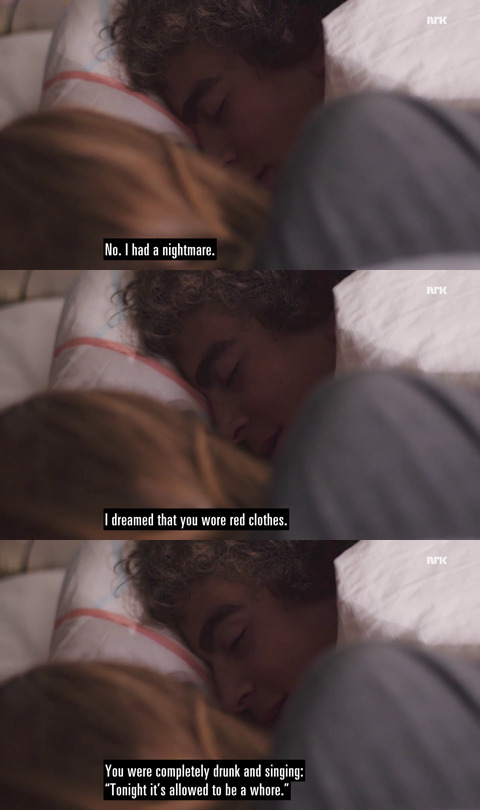
Russetide is a tradition in all of Norway, but western Oslo (where Skam is set) is one of the richest areas in the country and, as such, they really go above and beyond with it. A bus is better than a van, the buses have to be decked out with the best sound systems. The crew has to have not just hoodies but also headbands and other merch, and it all has to follow the theme the crew has chosen. And if you really are the hottest of hot shit, then you actually commission legit artists to write a theme song for your bus. We can see this in s2, where the girls discuss The Penetrators theme song.
There are a bunch of different Norwegian artists that you can commission for your Russe song, but the most famous are probably TIX and the Pøssy Project. The Pøssy Project is a group of multiple songwriters, but all of its members have chosen to keep their identites anonymous because, as it turns out, ~Norwegian adults~ think everything I'm about to explain is trashy and disdainful. The one artist in The Pøssy Project that has always owned his participation in it is Andreas Haukeland, better known as TIX. (You might also know him as this year's ESC entry for Norway.) Why does TIX stand by these songs? Idk, probably because they're extremely popular, chart well, and make money, and by standing by them, he gets to perform them in gigs and profit off those creations.
SJEIKEN 2015 has featured twice in Skam, first in s1e1. It's also the song Pepsi Max is singing when they party at Sana's place in s4. And SJEIKEN 2015 featured so prominently in Skam because the song became a runaway hit the year before (the 2014-15 school year), breaking into the Norwegian charts as well as Spotify most playeds in Norway. It is a tremendously popular song that people loved.
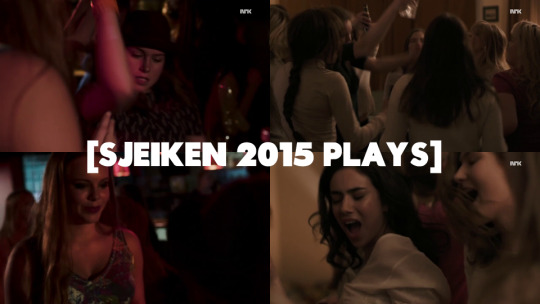
So, who or what is SJEIKEN 2015 about? SJEIKEN is a 2015 Russe crew (meaning they graduated high school in 2015) who chose to make their Russe theme about... oil sheikhs. That is what sjeiken means. The song itself is about an oil sheikh called Sheikh Yer Bouti who declares tonight to be free of rules. His 400 wives are allowed to get drunk and be whores, just for tonight. Here are the lyrics:
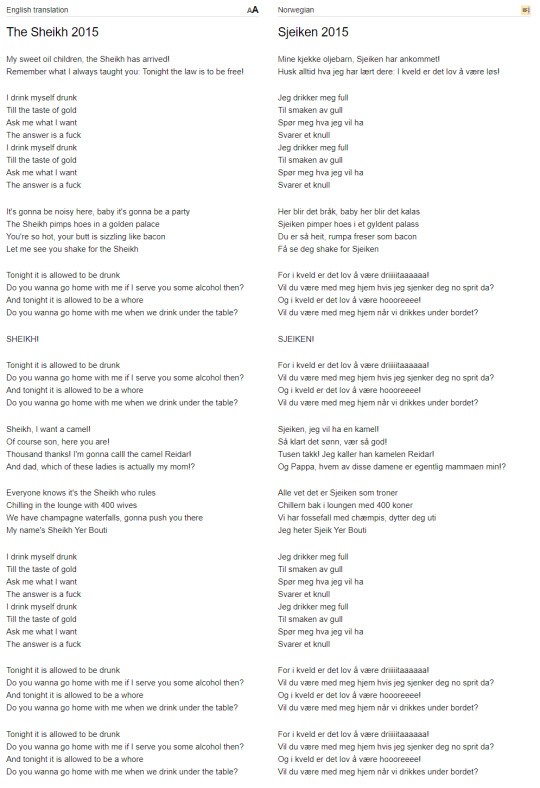
Now, TIX has recently tried to become a mature artist, and so he was recently asked about SJEIKEN 2015 (again, a song he performs to this day). This was his response:
At a party, I met a girl who was crying over a boy she liked. She had built up her expectations that this would be the night she finally hooked up with him, but she was afraid that if she did, the guys would call her "whore". I thought about it a bit… It's actually quite true - if a boy hooks 10 girls at a party he is a legend, but if a girl hooks up with only one boy she may risk being called loose. That's absolutely ridiculous! So I said to her, "Tonight you are allowed to be a whore. Tonight you are allowed to hook up with him.”
And like, I just want to say this response is horseshit, first of all lol. But in case you for some reason thought this was supposed to be like a feminist anthem for a girls' russe buss (a crew like Los Losers for instance), let me share a picture of the SJEIKEN Russe crew:
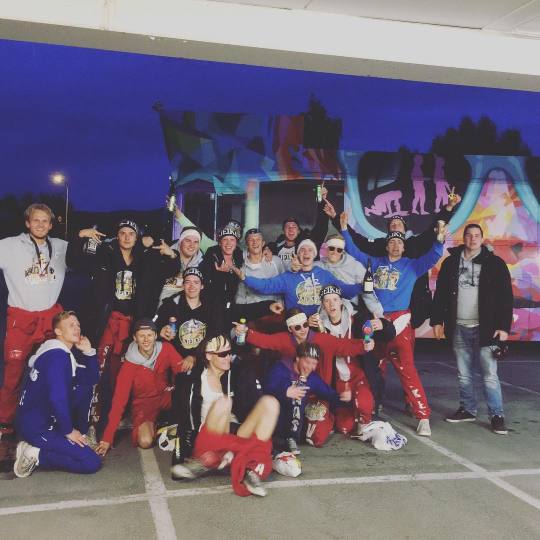
(Count the moc... Oh wait, there aren't any.)
SJEIKEN (the Russe crew) also participated at a Russe event back in 2015. Here is how they chose to stage their song:




(The one thing I can say about this is that the boy playing a niqabi doesn't appear to have taken it off at any point, which is better than Skam Italia did.)
At this point, you might think that perhaps Jonas might have reason to be appalled that Eva, who he assumed shared his values, decided to get involved in Russefeiring. However, one other thing about Russefeiring is that literally EVERY YOUNG PERSON in Norway is supposed to love all of this shit. My evidence is very anecdotal, but I once asked a Norwegian high school student how many people aren't involved in Russefeiring. He said everyone is, the only people who aren't are the friendless losers. I also came across a Norwegian young woman's blog who said she preferred talking to people from abroad, because she didn't have to explain to them that she never actually did Russe, because to admit she hadn't, would immediately show her to have been a total outcast in high school. Like, this is an issue for people into their twenties.
So Jonas isn't just taking a stance to be cool, the fact that he is vocally opposed to Russefeiring in every way makes him (and the boy squad) total losers. In fact, Chris Schistad referred to Jonas as a nerd and the boy squad plainly wasn't in William's radar at all. It wasn't a thing like in Skam NL, where Kes' squad was leagues and miles above Noah's squad in terms of coolness (MOTHERfucker... don't even try to tell me Gijs was cooler than Kes lmao). Jonas would've been seen as a loser and a burnout, and that's what Jonas was talking about when he told Eva that she was always doing the popular thing to do. Because he very staunchly refused to participate in this tradition, despite the fact that doing so made him an outcast, because, for him, THAT was the moral thing to do.
Having read all this (you poor soul), and being on tumblr like you are, is it really that unthinkable that Jonas would think that Russefeiring and the culture associated with it is crap? Do you really think a 16-year old has the nuance to say, "you know, Russefeiring stands for everything I hate, but since you're friendless because of me, and this is your chance at having friends, I will put my ideals aside and support you in this." Absolutely not lmao. How many of you would even now shit on friends if they stepped outside the line of what tumblr considers woke? How many people on twitter turn on each other for transgressions like stanning the wrong Skams? Jonas was shitty because he was super rigid in what he considered the right way to behave, but in that sense, he was actually one of the most accurate portrayals of a specific type of Gen Z. Unlike idk, characters who quote fucking Animal Farm to talk about school festivals.
(And NOW that all of that has been established, I can finally begin dissecting season 1 lol.)
71 notes
·
View notes
Photo
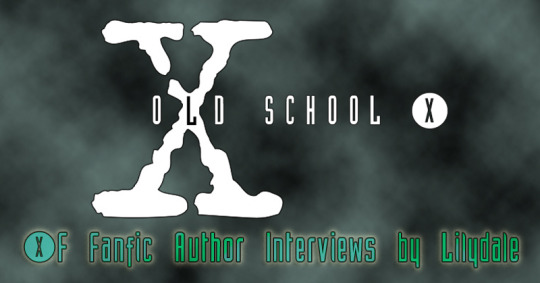
Old School X is a project interviewing X-Files fanfic authors who were posting fic during the original run of the show. New interviews are posted every Tuesday.
Interview with bugs
bugs has 40 stories at Gossamer. They mostly focus on Mulder and Scully, but there are also some goodies featuring Reyes and Doggett. I’ve recced some of my favorites of her fics here before, including The Link. She also co-ran WhyIncision, a fun, smart X-Files mailing list that dissected fics like a book club. Big thanks to bugs for doing this interview.
Does it surprise you that people are still interested in reading your X-Files fanfics and others that were posted during the original run of the show (1993-2002)?
Not really. While I was still in high school, I started watching the then 20 year old OG Star Trek and became a Trekkie of a sort. Starlog magazine, James Blish novels and the other novelizations, and while I was working as a library page, I found fanfiction one day among the periodicals. Who knows how fanfiction ended up as part of a library's materials, but there it was, this tattered mimeographed collection. The fic that had the most impact on me was one where Nurse Chapel wrestled a giant alien snake to save Spock's life.
So when I got into XF, one of the first things I did was look for fanfic, knowing somewhere out there, Scully was wrestling a big snake for Mulder.
That experience showed me the power of fandom, that even without the internet, how the second generation of Trekkies joined the original group to advocate for the franchise to be revived. I remember sitting in the theater for that first awful Star Trek movie, choked up with what we'd done.
Tragic backstory way to say, no I'm not surprised that a well-produced show like XF would beget future generations of fans, and that they'd be chewing their way through the fanfic archives still being maintained.
What do you think of when you think about your X-Files fandom experience? What did you take away from it?
I'm so grateful to the fandom. Literally formed the life I have today through the confidence it gave me. Many of my friends to this day are 'pocket friends' from the various fandoms I've been in, and the longest friendships were formed in XF. I learned how to write, both technically and finding my voice. I learned how to think analytically, more than any college courses.
The two most important things I took away were, write for yourself first and always, and shit ain't that damn important. In the end, it's a TV show.
Social media didn't really exist during the show's original run. How were you most involved with the X-Files online (atxc, message board, email mailing list, etc.)?
YIKES. I came in at the Fight the Future summer hiatus, so the waning days of ATXC, then we moved to mailing lists, right? Yahoo Groups was in there somewhere. Finally message boards. Live Journal rose up at the end of the run which began to fragment the fandom even before the show ended, along with the migration off our individual websites to Archive of Our Own, fanfiction.net and such. We went from group discussion platforms to 'come look at my blog for my thoughts'. It was different and I didn't particularly like it, but in the end, when I came back to fandom for a new show....I had to get a Live Journal. That's the most interesting part of fandom, that a platform doesn't mold a fandom; we use the platform and when it's no longer useful to us, we abandon it en mass.
What did you take away from your experience with X-Files fic or with the fandom in general?
I've touched on that a bit, but to elaborate, I'm glad I started in the XF fandom. It had such high standards and I hope that I maintain those standards for myself to this day. These days, I don't usually have a beta reader, but that took a couple hundred posted fics to get to that point.
Having seen the same exact flamewars and divides and squabbles over and over, seen how the taste of 'fame' can drive someone to be rather unpleasant, has given me a much more 'whatever' attitude. It's sort of comforting when joining a new fandom to know what's going to happen next in its natural progression.
What was it that got you hooked on the X-Files as a show?
There's a meme "I have a type," and XF definitely had that type, but it just took me a while to get there. I was away at college then working on the road when the show started, and wasn't home on Friday nights most of the year. My mother has always been a big sci-fi fan, so she actually was watching before me. I don't like scary things, and would leave the room if it was on when I'd visit her. I was home for Christmas when Christmas Carol/Emily aired and I remember standing tentatively just inside the room so I could flee if necessary, and watched Scully go through the wringer, and ranting, "What the hell is this? Why are they putting that poor woman through this!?" I also saw how the show was doing the big ship tease, and I was like, uh, I don't have time for this. Even by my 20's, I'd been done wrong by so many shows that I'd become bitter. But the first film trailers suggested they were actually going from UST to RST, so I figured I could give 2 hours of my time for that. And yeah...but I was hooked, and WENT TO BLOCKBUSTER AND RENTED THE VHS TAPES TO CATCH UP....this interview is making me feel very old.
What got you involved with X-Files fanfic?
I've always been a shipper and have no shame in that, as I think forming and maintaining a relationship is the most conflict-ridden enterprise humans can attempt, and thus is the most challenging thing to write about. Like many fanfic writers, I'd 'told stories in my head' ever since I can remember about the characters from books, shows and movies. It was just a matter of then writing it down for the first time.
After I was sucked into the show and it was still the summer hiatus, I got on my first computer, dialed up that screeching modem, and went on Netscape to search for that fanfic I knew had to be out there from my Trek experience a decade ago. Like many people, after inhaling much of the delicious fics out there, I decided I can do that. I'm someone who's very methodical on my approach to something new, so I studied what worked/what didn't, the expected formatting, got a sense of the culture I was entering, acquired a critical beta reader, so when I actually submitted the first chapter to AXTC, I was calm and confident.
What is your relationship like now to X-Files fandom?
I watch from the sidelines, with a vague little smile on my lips.
Were you involved with any fandoms after the X-Files? If so, what was it like compared to X-Files?
Yes, I have. Battlestar Galactica had a lot of Philes, but it was still a big step away from the very organized fandom in X-Files. Plus, with so many characters, there could be lots of little groups focused on their favorites. Same in the Downton Abbey fandom. Just a different dynamic.
On the other end of the spectrum, one of my most popular fics is in the Silence of the Lambs fandom which I've never been involved with any other fans or their fandom, if it exists. It just sits out there on fanfiction.net and chugs along with the reads. My current fandom is The Doctor Blake Mysteries which is tiny but mighty--the saying is, we're six people and a shoelace. It's shown me that it's not the size, not the 'fame' possible, but the passion that makes a fandom.
Sadly, at least at this time, I don't think there will ever be an experience like The X-Files heyday. It was such a golden moment of the rise of internet and home computer use by the general public, a large generation of educated women having the time to participate in fandom, and there wasn't the amount of 'noise' that is distracting us all now. I'm so glad that you're doing this exercise to record our thoughts. We've already lost so many of the OG folks. My first beta, Janet Caires-Lesgold; Trixie, way too young; Shari, also too young; Brandon D Ray, leaving his family too soon; and many more.
(Posted by Lilydale on March 9, 2021)
82 notes
·
View notes
Note
have u ever talked abt matsumoto taiyous art? reading something he illustrated and the vibe is sooooooooooooo. having a great time
here and there in little tidbits. i have posted a lot of not very serious things about his works but never big beefier essays :) i recommend the blog @taiyomatsumoto who regularly shares his work and has some great summaries of his career (desktop viewing mandatory to check out all their links!)
what i think makes his work so special are his influences and range. i remember reading somewhere he tries to explore new ways to draw with each new comic, not sure how much of that is true, but what is true is that throughout his work you just see a lot of variation in art style that are not linear. it's rare already for comics but even rarer in manga to see someone draw with different art styles, as authors tend to have Their Style that sometimes gradually evolves over time, but the back and forth between stylization and techniques in his stuff shows me it's not gradual at all, but rather a purposeful exploration of different ways to draw. it's beyond neat!
as for influences - it's becoming increasingly common for western artists to mention how anime influenced their work, but it's a bit rarer for mangaka to show this much inspiration from euro comics. the big elephant in the room is gir/jean giraud/moebius, who's at this point influenced pretty much everyone under the sun, but who's character designs i feel echoed all around taiyo mastumoto's work. when i first watched tekkonkinkreet and saw the three assassins gear up in segmented, organic armors and pointed hats, i screamed a little :) or similarly, my first reaction at the chapter one of number 5...
i could talk about many, many details of his art but one that is close to me are his characters. His stories always feel deeply human, and the designs carry that too. the first thing i read of his, Cats of the Louvre, impacted me immediately for the faces of the characters, main and background, in how he drew France - they all looked like people I'd met. the streets felt real. they and all his characters have the complexity, imperfections and personality you could see in a crowd. it's a feat to breathe so much life into characters just by how they look. much appreciated seeing - first in concept art form, then in the final film - that design philosophy applied to animation with Inu-oh.
and here's the part of the post that gets personal...this is a manga blog, so you won't see posts about it here, and I rarely post about it online all together due to a lack of English access to them which turns into a lack of information on the wider internet, but i draw too, and have also been massively inspired by euro comics. I've grown up surrounded by them and have read such a bulk of things, and european authors make up most of my art inspirations, moebius being one of them. i...also vary style a lot, from a drawing to another, and almost always have. and i love drawing people...:) you see where this is going! I have never met taiyo mastumoto (I hope I will be able to one day) so I cannot know much of the details behind it, but so much of what makes his work special also touches me as something I try to do myself. it's like rolling in one direction and seeing a shooting star above you follow the same one...
and curiously i doubt being the only one as he is extremely popular here, I've even heard he's more popular than in Japan!
all around my favorite mangaka by far if I'm being subjective. and if I'm being objective, he's got one of the most interesting bodies of work in manga due to its uniqueness and variation.
one day, i might post about dissecting his character designs in more detail. in the meantime i would love to discuss about his art here if you have anything you wish to share...:) much, much glad you're having a great time!
4 notes
·
View notes